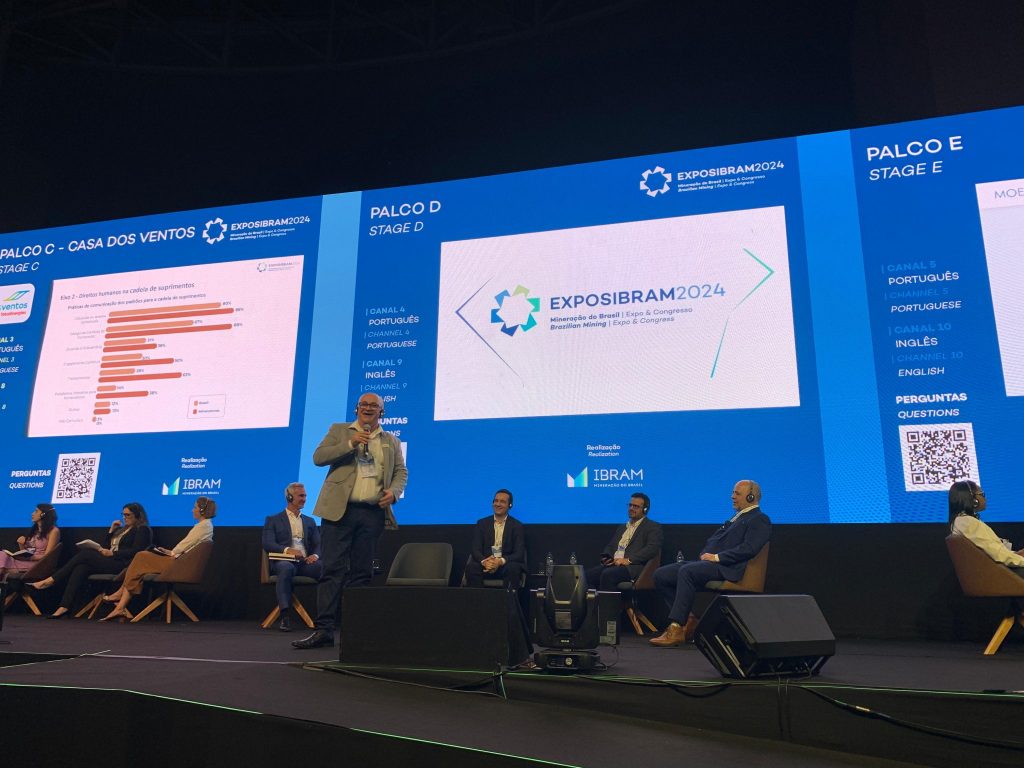
Brazil Potash presented its Autazes Potash Project at Exposibram 2024. Potássio do Brasil, the Brazilian subsidiary of Brazil Potash, showcased the project at this year’s event, which took place from September 9 to September 12 at the Expominas-BH Convention Center in Belo Horizonte, Minas Gerais. Exposibram, the largest mining exhibition and congress in Latin America, drew federal, state, and municipal authorities, as well as leaders from various sectors within the mining industry.
Adriano Espeschit, president of Potássio do Brasil, led a presentation on the Autazes Potash Project during the congress. His presentation included a video detailing the project’s scope and progress, particularly focusing on its environmental licensing history and the role it could play in bolstering Brazil’s agricultural capacity. The Autazes Project is situated in the city of Autazes, approximately 120 kilometers from Manaus, Amazonas. Espeschit noted that, since its preliminary environmental license in 2015, the project has achieved an installation license from the Amazonas Environmental Protection Institute (IPAAM), which now fully authorizes the construction phase.
Espeschit also emphasized the involvement of the local Mura people, a key indigenous community in the Autazes region. In September 2022, the Mura people voted with more than 90% approval to support the Autazes Potash Project, as part of a Protocol they organized. This community support was a pivotal moment, allowing the licensing process to proceed, according to Espeschit. “In September of last year, the Mura People decided by more than 90% of the votes to approve the Autazes Potash Project, according to a Protocol led by them, and from then on we advanced in the licensing process, receiving the installation license that guarantees the construction of the Project, which is now fully licensed,” Espeschit said.
Espeschit spoke on a panel titled “Advances and Trends in Environmental Licensing Legislation,” alongside other notable figures in the field. Panel members included Alexandre Oheb Sion from Sion Advogados, who moderated the discussion; Daniel Maciel, general legal manager of Mineração Rio do Norte; Werner Grau Neto from Pinheiro Neto Advogados; and Rodolpho Zahluth Bastos, Deputy Secretary of Environmental Management and Regularity at SEMAS-PA. The session explored the complexities and evolving landscape of environmental regulations for mining operations in Brazil.
The Autazes Potash Project is important for its mineral potential and its implications in Brazil’s agricultural sector. Potassium, a crucial mineral for fertilizers, is one of the main inputs required in agriculture, alongside nitrogen and phosphate. Brazil, as one of the world’s largest food producers, is heavily dependent on potassium for crop production, which supports food supplies for an estimated 1.6 billion people globally. Espeschit highlighted the strategic role of Brazil’s agricultural industry in feeding global populations and stressed the need for sustainable access to fertilizer components. “We probably have the second largest potassium evaporite basin in the world,” Espeschit said, underscoring the significance of the project.
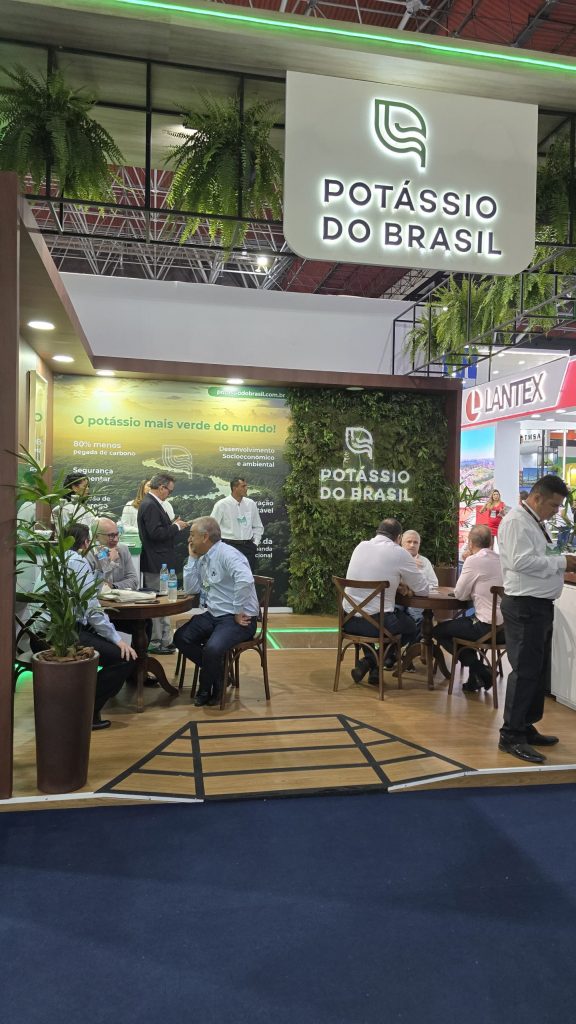
The Potássio do Brasil booth also garnered considerable interest from attendees. Visitors could explore aspects of the Autazes region’s culture, with displays featuring artwork and artifacts by the Mura people. The Mura Indigenous Council (CIM), which represents indigenous villages in the region, contributed to the exhibit by providing handcrafted Mura headdresses, made by Lino Prado Mura, for display at the stand. In addition, Jeicy Mura, an artisan from the Mura community, designed shirts with Mura graphics, which were also on display.
Visitors also sampled cheeses produced in Autazes, showcasing another facet of the region’s cultural heritage. The display was part of Potássio do Brasil’s commitment as a “Citizen Company” to promoting the talents and traditions of the Mura community and fostering awareness of the local culture among a broader audience. Espeschit emphasized that Potássio do Brasil considers it essential to respect and integrate local cultural elements in all facets of its operations, from mining practices to community engagement.
The Autazes Potash Project has attracted attention due to Brazil’s current dependency on imported potassium, which accounts for approximately 98% of the country’s supply. As the world’s fourth-largest consumer of fertilizers, Brazil aims to decrease this reliance on imports by harnessing domestic resources through the Autazes Project. If successful, the project would allow Brazil to secure a more self-sufficient supply of this essential mineral, which is crucial for the continued growth of the nation’s agricultural sector.
Throughout the exhibition, Potássio do Brasil presented its approach to sustainable mining, emphasizing its commitment to minimizing environmental impact. Espeschit asserted that sustainable mining can be achieved “whether in the Amazon or in another biome.” He reiterated that responsible practices are integral to the Autazes Potash Project operations in the Amazon, highlighting that all phases of the project, from planning to construction, are subject to rigorous environmental standards.
As Brazil Potash moves forward with the Autazes Project, the company anticipates it will support Brazilian agriculture by reducing dependence on imported potassium fertilizers and helping to stabilize domestic fertilizer supplies. The project, if successful, could reshape Brazil’s position in the global fertilizer market and bolster the country’s agricultural productivity for years to come.
The above references an opinion and is for information purposes only. It is not intended to be investment advice. Seek a licensed professional for investment advice. The author is not an insider or shareholder of any of the companies mentioned above.
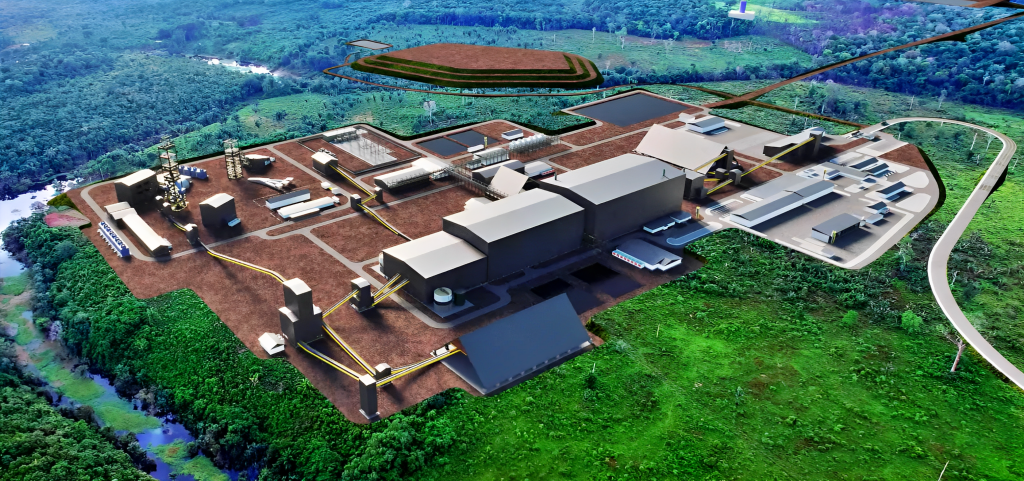
Brazil Potash has successfully obtained all the necessary permits and licenses for the construction of its Autazes Potash Project. This development marks a significant milestone in Brazil’s efforts to enhance food security both domestically and globally. The Project is strategically located in the municipality of Autazes, Amazonas, and is set to become a critical component of the nation’s agricultural sector.
Adriano Espeschit, President of Potássio do Brasil, commented in a press release: “This crucial achievement allows us to move forward in the construction of the large-scale project, which has already started with initial activities on site, but will last an average of four years to be fully ready for operation. We are finalizing the planning of necessary tasks, such as the relocation of wildlife, archaeological surveys, and the suppression of vegetation in an appropriate and environmentally responsible way. These preparatory efforts are essential to lay the groundwork for the start of civil works by the end of this year. Until then, we are preparing for large-scale construction activities on several fronts, representing a significant advancement in the development schedule of our Project. We believe that the Project will create increased benefits for the communities in the region.”
Project Location and Environmental Considerations
The Autazes Potash Project is situated on low-density former cattle farmland in the municipality of Autazes, Amazonas. Notably, the construction and operation of the Project will have no impact on any primary growth rainforest. This consideration is crucial given the global concern over deforestation and environmental degradation in the Amazon region. Brazil Potash has emphasized its commitment to environmental sustainability throughout the planning and development stages of the Project.
Licensing and Permits
Brazil Potash, through its wholly-owned subsidiary Potássio do Brasil Ltda., has obtained a total of 21 Installation Licenses, Specific Environmental Licenses, and Authorizations for the Capture, Collection, and Transport of Wild Fauna. These were issued by the Institute of Environmental Protection of Amazonas (IPAAM). The licenses cover all aspects of the Project, including the sinking of two mine shafts, the construction of the processing plant, a river barge port, and a 13-kilometer road connecting the processing plant to the port.
Initial Construction Activities
Preliminary construction activities for the Project have already commenced, facilitated by the issuance of some earlier Installation Licenses. Among these activities, the drilling of two wells for drinking water collection was completed. Each well reached a depth of approximately 130 meters. These initial works were carried out near the village of Urucurituba in Autazes. The Project has already started to benefit the local community, particularly through the contraction of local accommodation services and food service providers.
Community Impact and Job Creation
Brazil Potash is committed to ensuring strict compliance with all environmental criteria established in the licensing documents for the Autazes Potash Project. As construction progresses, the Company expects to create significant opportunities for the communities of Autazes and the surrounding region. The procedures for hiring personnel for civil construction have already been initiated, and a network of service providers and suppliers is being developed. These stakeholders can register for free on the Potássio do Brasil website, allowing them to participate in the Project’s growth.
The construction of the Autazes Potash Project is expected to have a far-reaching impact on both regional and national development. Most importantly, it will play a crucial role in enhancing food security in Brazil and the world by ensuring a steady supply of potash, a key fertilizer in agricultural production.
Future Development and Operational Phase
Upon the completion of the construction phase, and following government inspection to ensure compliance with safety standards and Brazilian legislation, Potássio do Brasil anticipates receiving the required Operating License and Mining Concession. The Project is projected to have an extraction and operational period of at least 23 years, during which potash ore will be mined and processed to support agricultural needs.
Commitment to Sustainability
Brazil Potash has also made a strong commitment to sustainability by pledging to use primarily renewable energy sources for its operations. This commitment aligns with Brazil’s national strategy to maintain its position as a global leader in renewable energy adoption. By leveraging renewable energy, the Company aims to offset approximately 1.2 million tons of carbon emissions annually, contributing positively to the global fight against climate change.
The power grid operations of the Autazes Potash Project will be connected to the national grid via a transmission line, ensuring a reliable and sustainable power supply. This connection will also bring benefits to local communities that currently depend on diesel generators, providing them with a cleaner and more sustainable energy source.
The fully permitted status of the Autazes Potash Project is a major achievement for Brazil Potash and the broader Brazilian agricultural sector. With all necessary licenses and permits in place, the Company is poised to move forward with the construction and eventual operation of a project that promises to enhance food security, support regional development, and contribute to environmental sustainability.
The above references an opinion and is for information purposes only. It is not intended to be investment advice. Seek a licensed professional for investment advice. The author is not an insider or shareholder of any of the companies mentioned above.
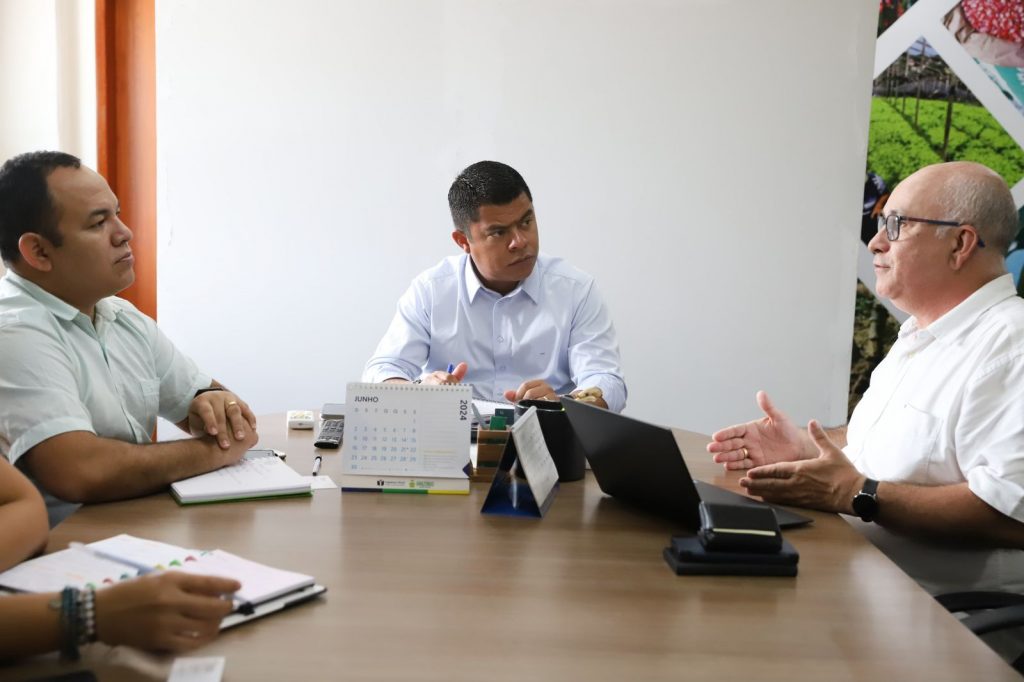
Sepror and Potássio do Brasil (Brazil Potash) have joined forces to push forward the development of the mining industry in Amazonas, a move set to generate thousands of jobs within the next four years. This collaboration aims to explore the mineral sylvinite, the primary raw material for potassium, in the municipality of Autazes, located 113 kilometers from Manaus.
Potássio do Brasil Ltda, led by president Adriano Espeschit, is at the forefront of this project. The company is already in the implementation phase, complying with various legal and environmental standards. This Wednesday, Espeschit met with the Secretary of State for Rural Production, Daniel Borges, and executive secretaries Larissa França and Eirie Vinhote to discuss a Technical Cooperation Agreement (TCT). This agreement aims to benefit the communities in the Rio Madeira region where the mining industry will be established.
Daniel Borges commented: “We, as the Government of Amazonas, support the Autazes Potassium Project with great enthusiasm, understanding that the demand for this mineral is large and permanent, that is, it will greatly help the Brazilian Primary Sector, in addition to the benefits of implementing this structure in the interior of our state, which will benefit thousands of people with new job opportunities, all aligned with the Amazon region and its specificities.”
The exploration of sylvinite has been contemplated for over 30 years. Now, it is on the verge of becoming a reality, promising to bring significant economic benefits to the local population. The projects under this initiative will include individual and collective training, as well as the creation of new businesses to supply products and services, such as uniforms and food for the employees of Potássio do Brasil.
Daniel Borges emphasized that the development of the Primary Sector is a key priority for Governor Wilson Lima. The exploration of Autazes Sylvinite stands out as a major driver of this development. Potássio do Brasil plans to occupy a 500-hectare area for the exploration of sylvinite. However, the company’s social commitments extend beyond this area. They include acquiring land for economically viable crops, which was among the topics discussed during the meeting. These proposals aim to bring development to the indigenous communities and tribes of the Mura ethnic group residing in the region.
“Potassio do Brasil began investing in the Amazon in 2016 and we have already outlined several projects that will bring sustainable development to this region, even before the Silvinita mining industry began operating. So, in addition to all the licensing and authorization, we are seeking out stakeholders like Sepror, to be as assertive as possible regarding the needs of the communities and the correct way to reach them. I am grateful for the reception and I assure you that I am optimistic about the possibility of a partnership with Sepror”, highlighted Adriano Espeschit.
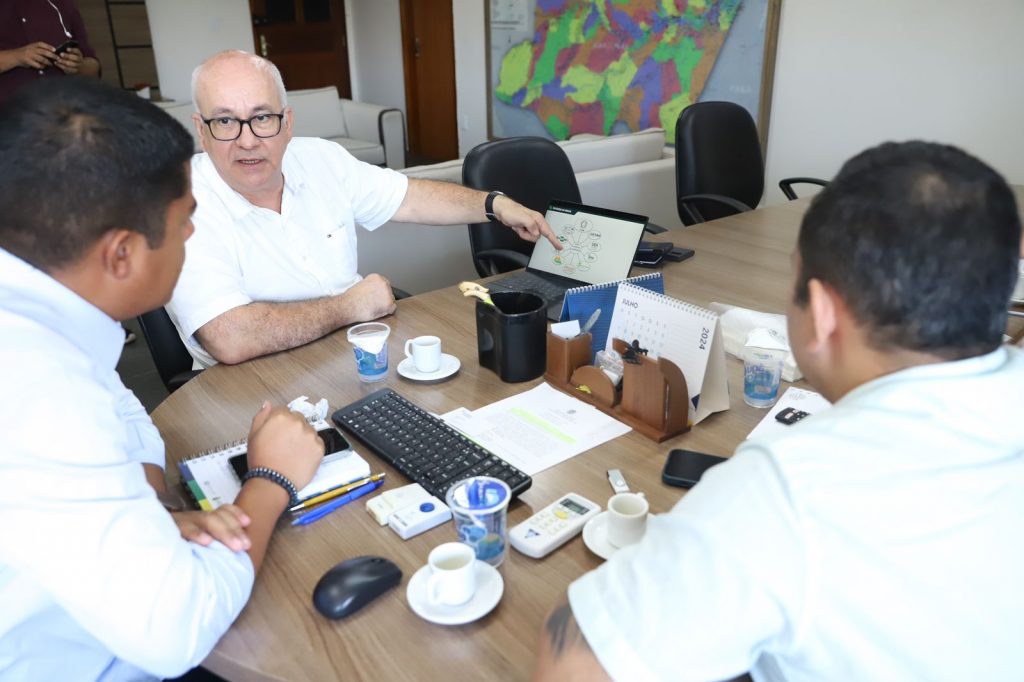
Potássio do Brasil has guaranteed that at least 80% of the workforce in the silvinite exploration industry will be sourced from Amazonas, with a preference for individuals from the Autazes region. This commitment opens up numerous opportunities for training and employment for the local population.
In addition to this major project, Potássio do Brasil has already initiated several other projects in collaboration with various institutions. One notable partnership is with the Brazilian Agricultural Research Corporation (Embrapa). Together, they have established two native tree seedling nurseries, which have produced tens of thousands of trees. Two indigenous staff members have planted at least 60,000 trees on deforested and degraded lands, contributing significantly to the restoration of the green layer above ground.
The partnership between Sepror and Potássio do Brasil marks a significant step forward in the development of the mining industry in Amazonas. With the alignment of the Technical Cooperation Agreement and the ongoing projects, this collaboration promises to bring economic growth, job creation, and environmental restoration to the region. The exploration of sylvinite in Autazes is set to become a cornerstone of Amazonas’ economic development, benefiting both the local population and the broader region.
The above references an opinion and is for information purposes only. It is not intended to be investment advice. Seek a licensed professional for investment advice. The author is not an insider or shareholder of any of the companies mentioned above.
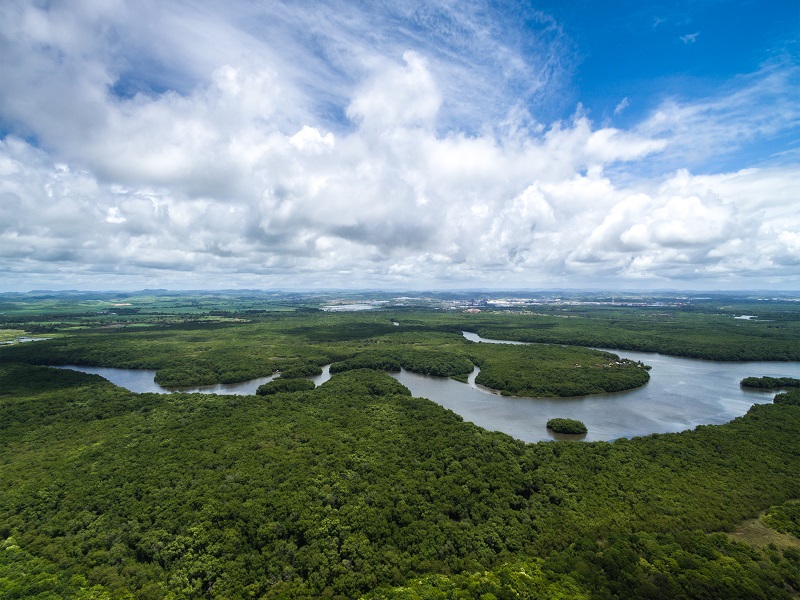
Brazil Potash has announced the formation of an advisory board to support the advancement of its Autazes potash project towards construction. The board will be chaired by Mayo Schmidt and includes Kátia Abreu, Luis Adams, Helio Diniz, Maria Claudia Guimaraes, Cidinho Santos, and William Steers. These individuals bring a wealth of experience in various sectors, particularly in Brazil’s agricultural, legal, financial, and mining industries.
Brazil Potash’s Executive Chairman Stan Bharti commented “Brazil Potash has assembled a very impressive advisory board with extensive depth of networks in the fertilizer sector, Brazil’s government and the investment community that will contribute meaningfully to transitioning our construction ready Autazes Project into the next major potash producer. Each advisory board member is a skilled leader with a strong network that will provide good advice and insights to our international board of directors with majority having on-the-ground presence in the heartland of Brazil’s farming community, Mato Grosso.”
Mayo Schmidt, the advisory board chair, has an extensive background in leading major companies. He previously served as Chairman and CEO of Nutrien, the world’s largest potash producer, where he managed global acquisitions and initial public offerings. Schmidt also held top positions at Viterra and Hydro One and has a history of working with major agricultural companies like General Mills and ConAgra.
Kátia Abreu, a former Brazilian Minister of Agriculture and Senator, brings significant political and agricultural expertise. Abreu has served as head of Brazil’s National Agriculture and Livestock Confederation, representing over a million producers. She was also a vice-presidential candidate in Brazil’s 2018 elections.
Luis Adams, a former Attorney General of Brazil, offers legal expertise. Adams is currently a partner at Tauil Chequer Advogados, associated with Mayer Brown in São Paulo. His tenure as Attorney General under Presidents Lula and Dilma saw him lead major judiciary cases and environmental agreements.
Helio Diniz, one of Brazil Potash’s founders, has over 40 years of experience in mining. He played a crucial role in the development of Brazil’s Sao Bento gold mine and the discovery of the Araguaia Nickel Deposit. Diniz also has experience with Xstrata and Forbes & Manhattan Inc., founding several companies, including Aguia Metais, Belo Sun Mining, and Irati Petroleo e Energia.
Maria Claudia Guimaraes brings financial market experience, having held senior positions at Bank of America Merrill Lynch, ING Bank, and ABN AMRO. She has served as an independent director for companies like Petrobras and currently runs Baobá Investimentos, a strategic financial advisory firm.
Cidinho Santos, a former Senator for Mato Grosso, focuses on agriculture. He co-owns Unibras Industria e Comercio de Biodiesel Ltda. and Uniao Avicola Agroindustrial Ltda., which are involved in biodiesel production and poultry processing.
William Steers has over three decades of experience in capital markets and project development in Brazil. He has worked with Docas Investimentos S.A. and served as an independent director for Petro Rio S.A., Brazil’s largest private oil and gas company.
Brazil Potash’s domestic production is expected to significantly impact global food security. Brazil, a leading exporter of agricultural goods, currently imports over 95% of its potash needs despite having one of the largest potash basins in its backyard. The company aims to reduce greenhouse gas emissions by cutting maritime transportation and producing potash locally.
Brazil Potash’s project is nearing construction readiness, with a completed feasibility study, EISA, and most necessary permits obtained. The company expects to deliver potash at competitive costs, contributing to Brazil’s agricultural sector and reducing environmental impact.
The above references an opinion and is for information purposes only. It is not intended to be investment advice. Seek a licensed professional for investment advice. The author is not an insider or shareholder of any of the companies mentioned above.

Brazil Potash announced the voting results from its Annual and Special Meeting of Shareholders, where the nominees listed in the Notice of Meeting dated May 29, 2024, were elected as directors. The company welcomed three new directors: Brett Lynch, Deborah Battiston, and Peter Tagliamonte. These new additions aim to provide further expertise and relationships as Brazil Potash finalizes permits and secures funding for project construction. The outgoing directors, David Gower, Carmel Daniele, and Andrew Puller, did not seek reelection. The company expressed gratitude for their valuable contributions, commitment, and sound knowledge, which helped bring Brazil Potash to its current near-construction-ready state.
Matt Simpson, CEO of Brazil Potash commented in a press release: “Brett, Deb and Peter will make great additions to our board given their years of experience in raising funds for project construction and/or permitting natural resource projects. These directors also bring important relationships across multiple relevant sectors that could be instrumental in unlocking further value for Brazil Potash stakeholders.”
The Board now consists of six directors: Chairman Stan Bharti, CEO Matt Simpson, the Honorable Pierre Pettigrew, Brett Lynch, Deborah Battiston, and Peter Tagliamonte. Four of these directors are independent, all possessing extensive experience in the natural resource sector.
Brett Lynch is a seasoned international company director and chief executive with a strong background in mining and mining-related businesses across Australia, Asia, and North America. With over 30 years in the global industry, Lynch has held senior positions at leading resource companies such as MIM Holdings, New Hope Corporation, Orica, VLI, and Sayona Mining Ltd., overseeing multi-million dollar international operations. He holds a Bachelor of Engineering (Mining) from the University of Melbourne, a Graduate Diploma of Business (Accounting) from Monash University, and a Company Director Diploma from the Australian Institute of Company Directors.
Deborah Battiston brings over 35 years of experience in the mineral resource mining and production sector. She has served as a director and chief financial officer for several Canadian public mineral resource companies, including Allana Potash Corp. As CFO of Allana Potash, she played a crucial role in multiple equity raises, acquisitions of significant mining assets, and the sale of Allana to Israeli Chemical Ltd., the world’s largest potash producer. Battiston holds a BA in Economics, is a Chartered Professional Accountant (CPA), and has an Institute of Corporate Director-Director (ICD.D) designation.
Peter Tagliamonte, an accomplished mining engineer, has an extensive 35-year career with significant achievements in developing large international mining projects. He specializes in underground mine development and shaft sinking, with over 20 years of experience in Brazil and fluency in Portuguese. Tagliamonte has managed complex regulatory environments and operational challenges, earning the title “Mine Manager of the Year” by the Mining Journal in 2005. He holds a mining engineering degree and an MBA from the University of Western Ontario.
Brazil Potash Obtains Processing Plant Installation License for Autazes Potash Project
On June 12, 2024, Brazil Potash Corp. announced that its Brazilian subsidiary, Potássio do Brasil Ltda., had received the processing plant Installation License, enabling the construction of the potash processing plant at the Autazes potash project. The Institute for Environmental Protection of Amazonas (IPAAM) issued 12 Installation Licenses and Authorizations, including those for the mine, processing plant, and port, allowing construction to begin.
The processing plant will be located in an area traditionally used for cattle pastures, aligning with Autazes’ economy, which is based on dairy and beef cattle. Initial construction activities have started, including drilling water wells near Urucurituba, benefiting the local community through lodging and food service provider usage.
IPAAM’s licenses allow Potássio do Brasil Ltda. to conduct vegetation suppression, archaeology services, rescue and handling of local fauna, and earthworks for the mine, processing plant, and port construction. Upon completing construction and government inspections, the Operating License will be granted, allowing for potash ore extraction and processing, expected to last at least 23 years.
Potássio do Brasil Begins Implementation Activities of the Potássio Autazes Project
On May 1st, Labor Day, Potássio do Brasil, a subsidiary of Brazil Potash, marked a significant milestone by beginning the implementation activities of the Autazes Potash Project. Equipment has started arriving in Urucurituba, Autazes, and initial hires are underway. The company aims to ensure quality and efficiency throughout the project while prioritizing environmental and social responsibilities. Potássio do Brasil continues to provide opportunities for job seekers and suppliers interested in joining this valuable project.
The above references an opinion and is for information purposes only. It is not intended to be investment advice. Seek a licensed professional for investment advice. The author is not an insider or shareholder of any of the companies mentioned above.

Brazil Potash’s wholly-owned Brazilian subsidiary, Potássio do Brasil Ltda., has received the processing plant Installation License from the Amazon state licensing agency, the Institute for Environmental Protection of Amazonas (IPAAM). This license allows the construction of the potash processing plant to proceed at the company’s Autazes potash project. In total, IPAAM has issued 12 Installation Licenses and Authorizations, including for the mine, processing plant, and port, enabling construction to commence.
Adriano Espeschit, President of Potássio do Brasil, commented in a press release: “Potássio do Brasil strictly complies with all criteria described in our licensing documents. As construction work progresses, opportunities are also emerging for the communities of Autazes and the surrounding region. We have already started hiring people for construction and indirect jobs are beginning to emerge through a network of service providers and suppliers that are helping us in this phase of implementation. Construction of the Project we believe will contribute to regional and national development and to food security for Brazil and the world.”
The potash ore processing plant will be built in an area predominantly used for cattle pastures, as the municipality of Autazes is known as the “Land of Milk” due to its dairy and beef cattle industries. Following the issuance of the first Installation Licenses, some construction work has already begun, including the completion of the first water well and the start of a second well, both for drinking water and each approximately 130 meters deep. This work was completed near the village of Urucurituba, Autazes, and benefited the local economy through the use of local lodging and food service providers.
The licenses and authorizations from IPAAM allow Potássio do Brasil Ltda. to carry out vegetation suppression, archaeology services, local fauna rescue and handling, and earthworks as part of constructing the mine, processing plant, and port. Once construction is complete and passes government inspection for safety and compliance with Brazilian codes, the company anticipates receiving the Operating License, which will permit the extraction and processing of potash ore for an expected period of at least 23 years.
Potássio do Brasil has been working in partnership with the Mura indigenous community, who live 8km from the project site. The company participated in the II Assembly of the Mura People of Autazes on May 30th, 2024, to receive the Mura Good Living Plan, developed through consultations among 37 Mura villages surrounding Autazes.
Potássio do Brasil donated 20,000 seedlings grown in its own nursery, with CEO Adriano Espeschit stating, “We have already donated more than 42 thousand seedlings to contribute to reforestation in the municipality of Autazes and surrounding regions.” The company is committed to implementing around 30 socio-economic and environmental programs, many aligning with the interests and proposals of the Mura People.
The Mura people of Autazes, represented by the Mura Indigenous Council (CIM), have followed the Mura Consultation Protocol based on the United Nations International Labour Organization (ILO) 169 protocols for free, prior, and informed consultation. In the Mura People’s Assembly held in September 2023, 94% of the represented villages approved the project with over 90% support, exceeding the Mura’s own thresholds of 60% voter participation and 60% approval.
The above references an opinion and is for information purposes only. It is not intended to be investment advice. Seek a licensed professional for investment advice. The author is not an insider or shareholder of any of the companies mentioned above.

In a major milestone for Potássio do Brasil, a subsidiary of Brazil Potash, the company announced on May 3, 2024 that it has begun the implementation activities of the Autazes Potash Project on May 1, 2024. The first equipment has arrived in the village of Urucurituba, in Autazes, Amazonas, and the initial hires are already taking place, marking the beginning of a transformative project for the region.
The company remains committed to ensuring quality and efficiency in every detail of the process while minimizing any environmental impact. The company prioritizes its responsibility to the people and the environment, and progress will continue in the short, medium, and long term to uphold these values. As part of its commitment to the local community, Potássio do Brasil is providing opportunities for the selection of resumes and suppliers interested in working with the company and being part of this valuable project.
The commencement of implementation activities at the Autazes Potash Project aligns with Potássio do Brasil’s purpose of ensuring food security in Brazil and the world through the extraction of potash. This milestone marks an important day for Autazes and the surrounding region, as the project is expected to bring significant economic benefits and job opportunities to the area.
Installation Licenses and Project Progress
In a series of positive developments for the Autazes Potash Project, Brazil Potash Corp. has received several installation licenses from the Amazon State Environmental Protection Institute (IPAAM). These licenses allow the company to begin construction on various aspects of the project, following several years of environmental, social, and technical studies, as well as the successful completion of local Indigenous People’s ‘free, prior, and informed consultations.
The installation licenses granted to Brazil Potash Corp. cover crucial components of the project, including the construction of a river barge port on the banks of the Madeira River, a stockpile at the port, and the drilling of two water collection wells. These licenses are in addition to the previously issued installation license for the construction of the mine shaft and underground workings. The river barge port, located near the village of Urucurituba, in Autazes, is expected to supply 2.4 million tons of potash, targeting domestic farmers in Brazil. This port is anticipated to have a higher capacity than the existing ports in the Northern Arc, which are the main route of entry for imported fertilizers in the Amazon Basin.
The additional installation licenses will have a major impact on the project’s development and operational aspects. The construction of the river barge port and stockpile will improve the project’s logistical capabilities, facilitating the transportation and distribution of potash from the mine to the market. The drilling of two water collection wells will ensure an adequate water supply for the project’s operations, supporting sustainable and responsible mining practices.
By obtaining these installation licenses, Brazil Potash Corp. will now proceed with the necessary infrastructure development and operational preparations, moving closer to the commencement of construction and eventual production at the Autazes Potash Project. These advancements demonstrate the company’s commitment to responsible mining practices and its dedication to contributing to the region’s economic growth while prioritizing environmental stewardship and community engagement.
As Potássio do Brasil begins the implementation activities of the Autazes Potash Project, the company remains firm in its purpose of ensuring food security in Brazil and the world through the extraction of potash.
The above references an opinion and is for information purposes only. It is not intended to be investment advice. Seek a licensed professional for investment advice. The author is not an insider or shareholder of any of the companies mentioned above.
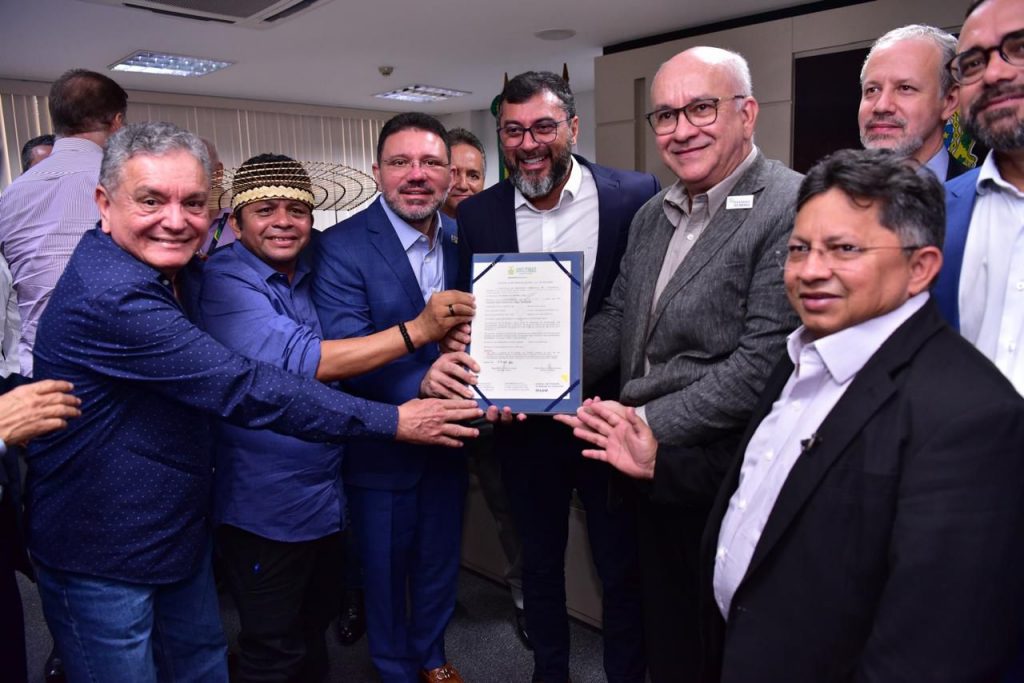
Brazil Potash through its wholly-owned subsidiary Potasssio do Brasil, has been granted three additional Installation Licenses (LIs) by the Amazon State Environmental Protection Agency (IPAAM) for the construction of the Autazes Potash Project in Autazes, located 112 km from Manaus. The licenses, issued on April 26th, cover the construction of a river port on the Madeira River, a stockpile at the port, and the drilling of two water collection wells. This brings the total number of LIs issued for the project to four out of an anticipated eleven, with the remaining licenses expected to be granted in the near future.
President of Potássio do Brasil, Adriano Espeschit, commented in a press release: “With Installation Licenses being granted for the mine, port, port stockpile and two water collection wells the Company is ready to start construction activities in the field, with the mobilization of personnel and equipment, within the areas foreseen and approved by the environmental agency.”
The first LI, allowing for the construction of mine shafts and underground workings, was issued on April 8th at an event attended by various government officials, including Amazon State Governor Wilson Lima, IPAAM President Juliano Valente, and representatives from the Mura indigenous people.
The new river barge port, situated near the village of Urucurituba in Autazes, will have a capacity of 2.4 million tons of potash, surpassing the combined capacity of the existing ports in the Northern Arc (Itacoatiara, Vila do Conde, and Santarém), which currently handle around 1.7 million tons of imported fertilizers in the Amazon Basin. The potash produced at the Autazes Potash Project will be primarily targeted at domestic farmers in Brazil.
Potassio do Brasil has complied with the United Nations International Labor Organization Convention (ILO-169), which requires free, prior, informed, and good-faith consultation with indigenous populations. The Autazes Potash Project was approved by more than 90% of the 34 villages out of a total of 36 that comprise the Mura people of Autazes, significantly exceeding the thresholds set by the Mura, which required 60% participation in the vote with support from at least 60% of the people voting.
Following the issuance of the first LI, Brazil Potash has initiated activities to implement the Autazes Potash Project, including the preparation of detailed engineering studies, a comprehensive review of the activity schedule, and quotations for critical path services. The company has also started drilling a second geotechnical hole approximately 1,000 meters deep to gather essential technical information for shaft sinking and construction.
Additionally, Brazil Potash has begun receiving resumes from individuals interested in working on the Autazes Potash Project through a dedicated page on the company’s website. Within three weeks, hundreds of expressions of interest have been received, demonstrating the strong community interest in participating in the project’s construction. Potential suppliers of goods and services can also submit their information through the company’s website, and presentations on the Autazes Potash Project are planned for the coming weeks to facilitate the contracting process for products and services during the construction and anticipated 25-year operation phases.
The above references an opinion and is for information purposes only. It is not intended to be investment advice. Seek a licensed professional for investment advice. The author is not an insider or shareholder of any of the companies mentioned above.
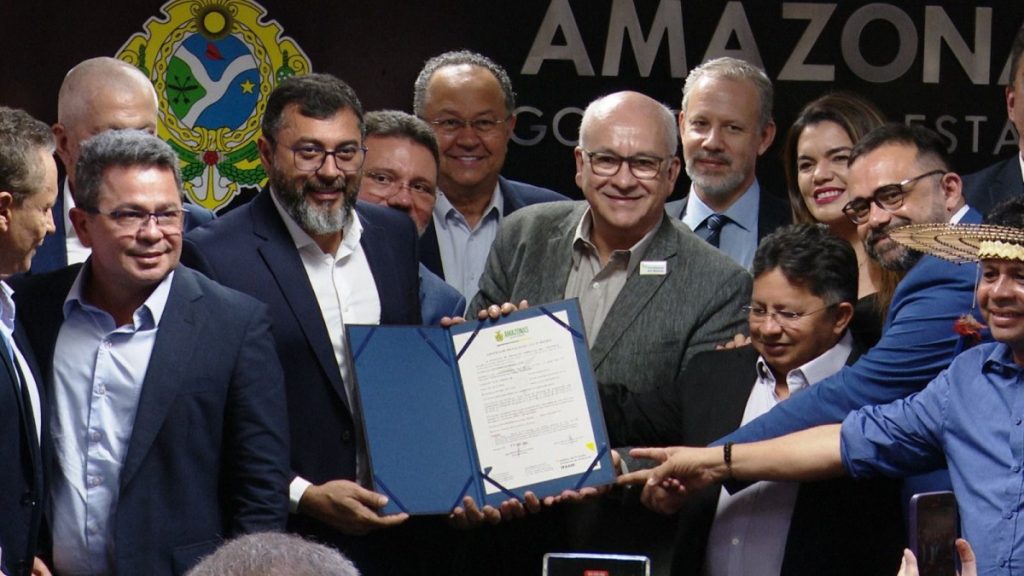
Governor Wilson Lima, on Monday, April 8, 2024, delivered the first environmental license for the Autazes Potash Project managed by Brazil Potash in the municipality of Autazes, located 113 kilometers from Manaus. This decision marks the end of a 15-year waiting period, initiating a project expected to majorly boost the local and national economy. During its installation phase, the project is anticipated to create 2,600 direct jobs. Once operational, it’s projected to generate over 17,000 direct and indirect jobs, making it an important contributor in Brazil’s job market.
Wilson Lima commented at an event at the State Government headquarters: “The implementation of an activity like this generates social indicators, quality of life for indigenous people, work opportunities, employment, income, advances in sanitation, water supply, asphalting of branches, education, health, in short, what It’s important so you can have a better place to live.”
President of Potássio do Brasil, Adriano Espeschit, stated: “Today we can say that Amazonas has a sustainable mining project, starting with this event. With this installation license, we will ensure that it moves forward and that these numbers and results become reality as quickly as possible. Thank you very much to the entire State Government team.”
The project, focusing on the exploration of potassium, a critical raw material for fertilizer production, aims to fulfill 20% of Brazil’s national demand. This initiative could significantly reduce the country’s reliance on imported ore. Potassium from this project will not only support Brazilian agriculture but also contribute to global food security, as stated by Raul Jungmann, the director-president of the Brazilian Mining Institute (Ibram).
“Brazil’s agricultural sector feeds approximately 1 billion inhabitants on the face of the earth. This means that we will reduce our external dependence on this mineral, which is decisive for our production”, stated Jungmann, who sent Ibram’s Director of Relations, Alexandre Valadares, to represent him at the event.
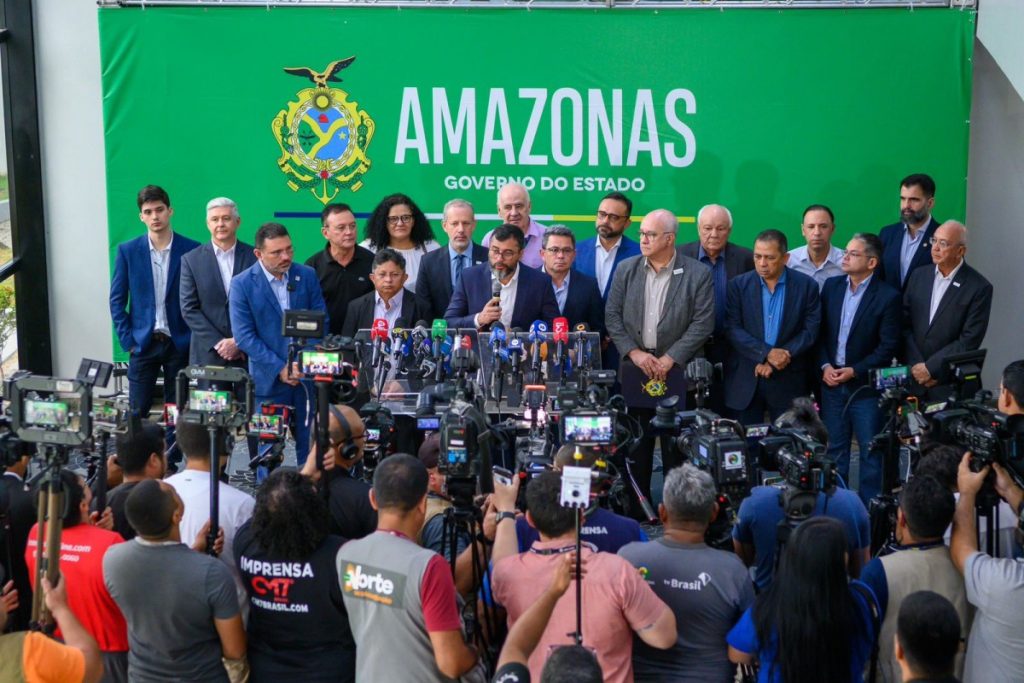
Potássio do Brasil, the company behind this venture, plans to invest US$2.5 billion in the project, with R$1 billion already spent. The construction of the manufacturing plant alone, expected to take 4 and a half years, will provide 2,600 direct jobs. The operation phase will offer 1,300 direct jobs and an additional 16,000 indirect jobs, with an emphasis on employing local workers, aiming for up to 80% local labor use.
The environmental aspect has been a significant consideration. Granted by the National Mining Agency to Potássio Brasil in 2009, the project promises to be among the most environmentally friendly potash explorations globally. This includes low carbon emissions and minimal surface impact due to the high-tech, 800-meter-deep underground mining techniques.
The event, attended by various government and local officials, emphasized the project’s benefits for the Mura people and the entire Amazonas population. The project has gained approval from local communities, including the indigenous Mura ethnic group, and is committed to environmental and social responsibilities. This includes infrastructure investments, social and environmental programs, and workforce training.
“Our people come from a lot of struggles and a lot of race. Now, we are here facing this historic moment. This venture comes to benefit us and has been expected for many years. We followed all the protocols, we complied with all the rules and from now on I only hope for much success for our indigenous people”, said the coordinator of the Mura Indigenous Council, Kleber Mura.
A 165 km long power transmission line and a 12-kilometer road reconstruction are part of the infrastructure development plans. Additionally, a large port for ore transportation and support for family farming with 2% of Potassium Chloride production are also planned. These efforts aim to provide extensive benefits to the Amazonas population, ranging from job creation and income generation to regional infrastructure development and environmental preservation.
“Ipaam’s role is to ensure that all licensing requirements are met as long as it authorizes the activity. It is a historic milestone for the State Government, because it enables an economic matrix that, I point out that after the Manaus Free Zone, is the second biggest ‘boom’ in the economy of Amazonas”, said the director-president of Ipaam, Juliano Valente.
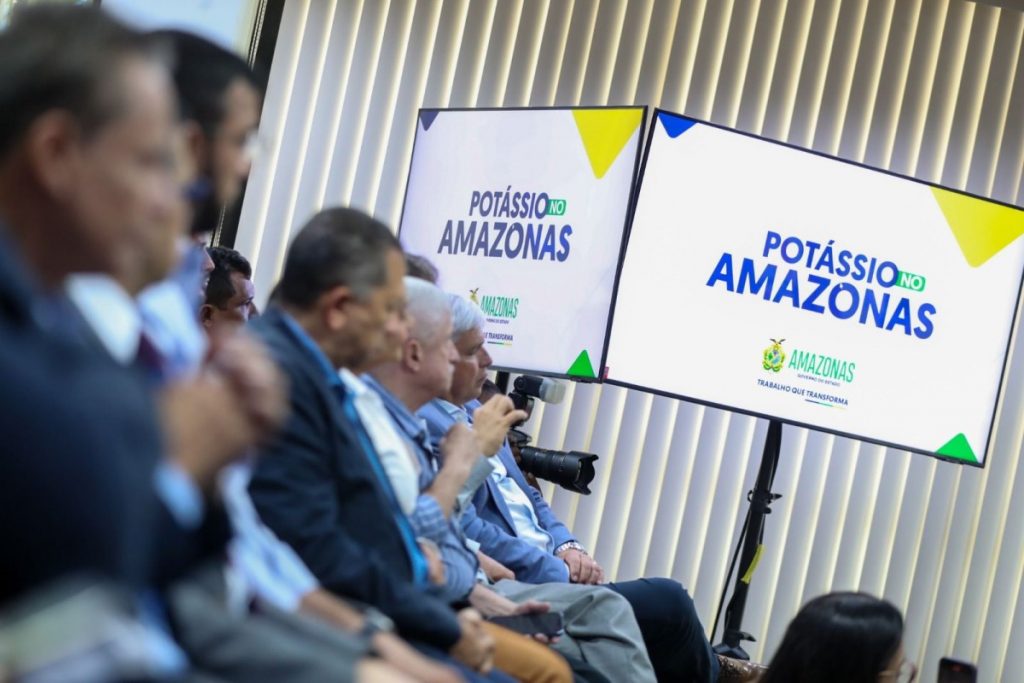
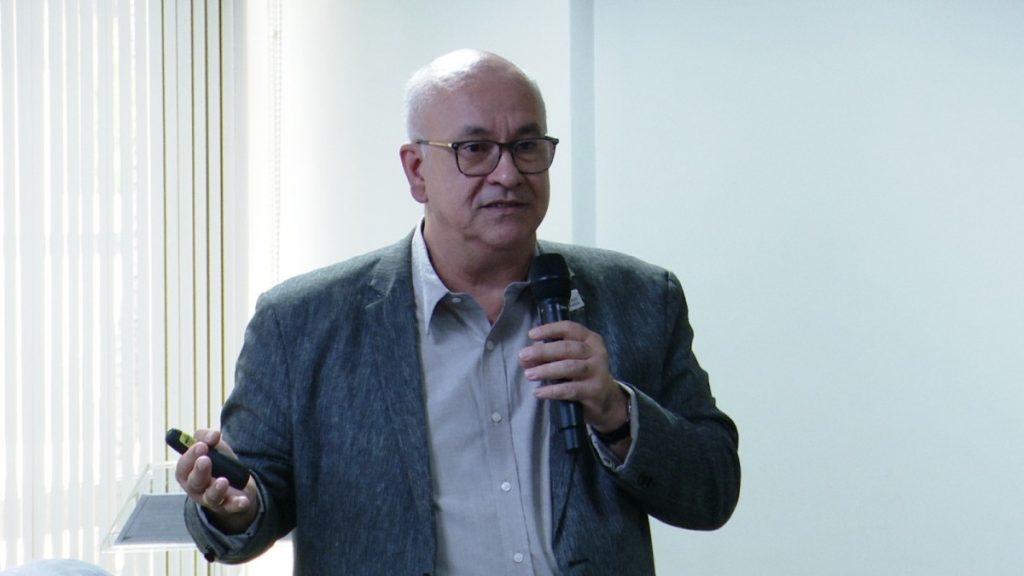
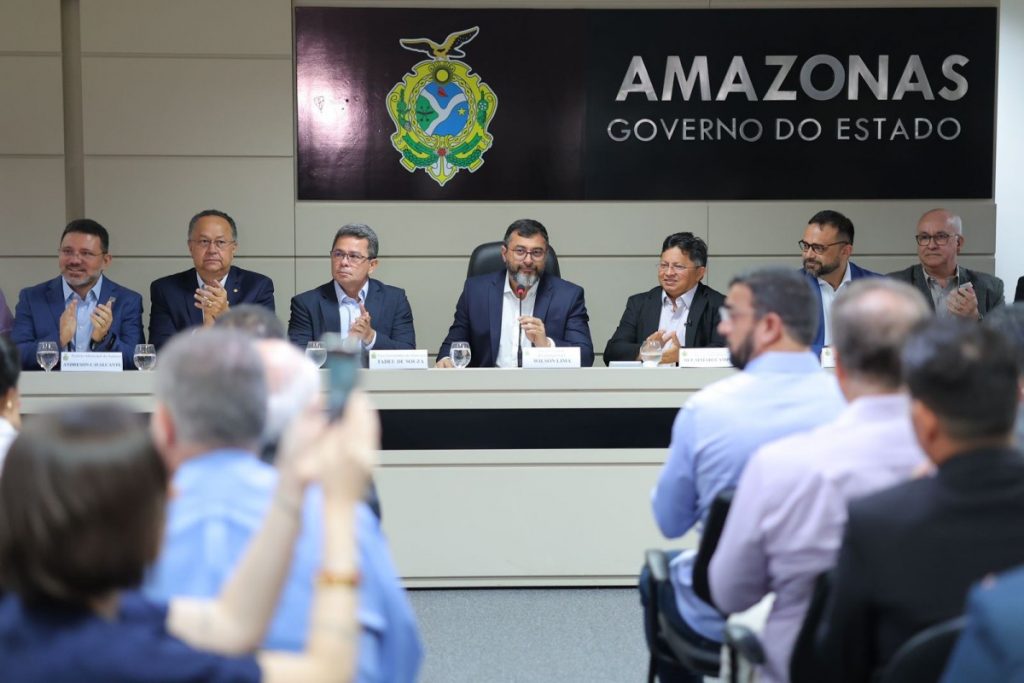
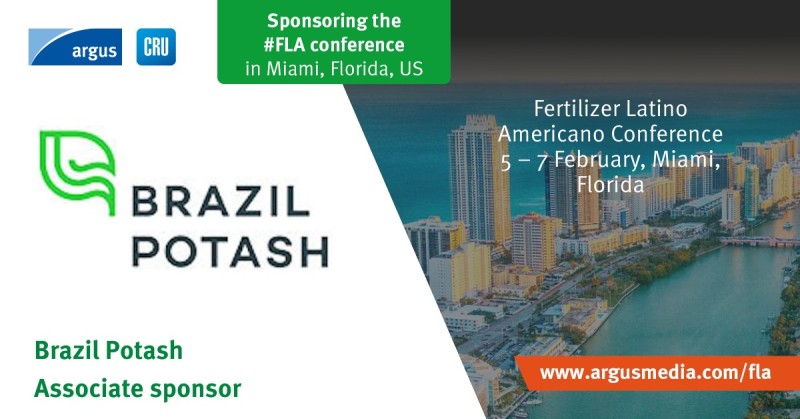
Brazil Potash, the leading potash development company in the country, is sponsoring the high-profile Fertilizer Latino Americano (FLA) 2024 International Conference being held this week from the 5th to the 7th of February in Miami. As a premier sponsor, Brazil Potash has an important role in the event, which has attracted over 800 attendees from across Latin America’s fertilizer industry.
CEO Matt Simpson is participating in the opening panel discussion focused on Brazil’s ambitious National Fertilizer Program. With decades of experience developing potash assets around the world, Simpson brings valuable insight into ramping up domestic potash production to reduce Brazil’s heavy imports of this key fertilizer ingredient.
Simpson will also be able to introduce Brazil Potash’s flagship Autazes Project, located in the Amazon region of central Brazil. Through its wholly-owned subsidiary, Potássio do Brasil Ltda, the company is advancing a large, shallow potash deposit near the town of Autazes. An initial economic assessment last year outlined a potential Tier 1 mine producing 4.3 million tonnes per year of potash over a 38-year lifespan.
Potash is a critical nutrient for Brazil’s mammoth agriculture industry, which must import over 96% of its current potash needs. By developing domestic potash production, Brazil can insulate itself from supply shocks and price spikes on global markets. The nation’s farmers also stand to benefit from more stable, lower potash prices over the long term.
Autazes Project for Brazil’s Fertilizer Independence
With mineralization starting at just 16 metres below surface, the Autazes Project offers some of the lowest-cost potash production potential in the industry. The deposit could supply potash to Brazilian farmers for decades to come as the country moves towards self-sufficiency.
Brazil Potash is working closely with municipal leaders in Autazes on a public consultation process as it moves towards feasibility and permitting over the next two years. The low-impact, efficient mine design includes backfilling the above-ground tailings into the mine as it advances. The company has also emphasized the critical role of potash in boosting yields on key crops like soy, corn, coffee, sugarcane, oranges, and cotton.
Conference Focused on Fertilizer’s Future in Latin America
With food security and agricultural productivity urgent priorities across Latin America, the FLA 2024 conference has attracted hundreds of stakeholders seeking strategic solutions. Over 800 attendees are taking part in panel talks, presentations, and exhibitions by top companies and experts.
The event also features Brazil’s Minister of Agriculture as a keynote speaker. Government representatives from Mexico, Peru, Argentina, Columbia and other Latin American countries are also participating.
In addition to domestic potash production strategies, conference programming covers global fertilizer price dynamics, new NPK plant investments, distribution logistics, raw material access, and more. The future of sustainable agrochemicals is another prominent theme this year.
For more information about the conference, click here.
The above references an opinion and is for information purposes only. It is not intended to be investment advice. Seek a licensed professional for investment advice. The author is not an insider or shareholder of any of the companies mentioned above.
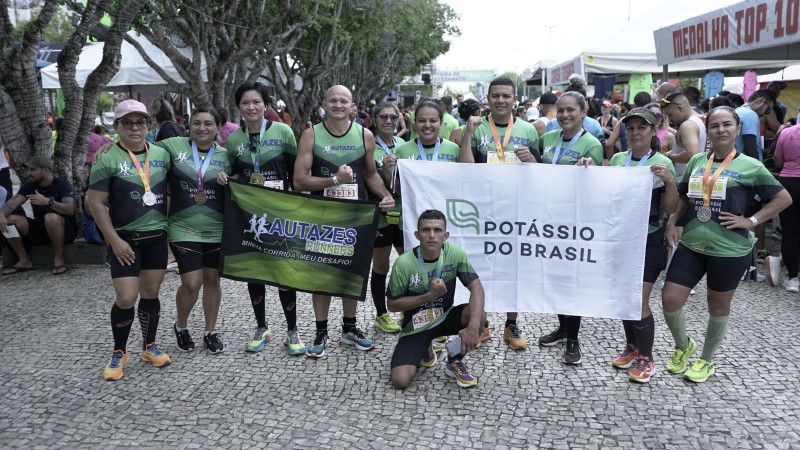
Potássio do Brasil, a subsidiary of Brazil Potash, recently facilitated the participation of 18 athletes from the Autazes Runners team in the 5th edition of the Manaus International Marathon. The event, held in Manaus, Amazonas, featured races of varying distances, starting as early as 4 am.
The company’s involvement aimed to address the logistical challenges faced by the runners and to promote health and community engagement. This move aligns with Potássio do Brasil’s broader commitment to fostering sportsmanship and well-being in the region.
Adriano Espeschit, President of Potássio do Brasil, expressed his satisfaction in supporting the local athletes. “We, at Potássio do Brasil, believe that sport is a powerful tool to promote health and community cohesion. By supporting these athletes from the Autazes Runners team, we want to boost sport in the municipality of Autazes and inspire the people of Autazes to adopt an active and healthy lifestyle,” he said.
Transforming Autazes
This support has reportedly transformed the city’s sports culture. Caio Cruz, the coordinator of the Autazes Runners team, noted the increasing popularity of running in Autazes, attributing it to the efforts of Brazil Potash and their own developmental work. “Before, it was unusual to see people running. Today, if you pass by Avenida Vinte de Novembro, which is the main road in our city, at night, you will see a crowd of people running, all thanks to the work we are developing and now with the support from Potássio that they have provided to Autazes Runners. We just have to thank Potássio do Brasil for the support and encouragement they have given to our city and our team,” Cruz stated.
New Records, New Starts
Edivane Bessa, a member of the Autazes Runners team, acknowledged the significance of Brazil Potash’s repeated support, especially for amateur athletes like themselves. “This is not the first time that Potássio has supported us, which is very gratifying, as we are amateur athletes. Potássio has offered assistance to our group of athletes who are unable to come here from Autazes [Manaus]. So for us, it’s a privilege because we’re receiving this support that we didn’t have previously. Now, we will return even happier for having completed the routes and achieved our personal records from last year,” Bessa mentioned.
The company’s support for local sports is contributing to Autazes’ growing reputation as a supportive environment for sporting and physical activities, fostering a positive impact on the city’s health and lifestyle culture, all while continuing to develop the important Autazes Potash Project.
The above references an opinion and is for information purposes only. It is not intended to be investment advice. Seek a licensed professional for investment advice. The author is not an insider or shareholder of any of the companies mentioned above.
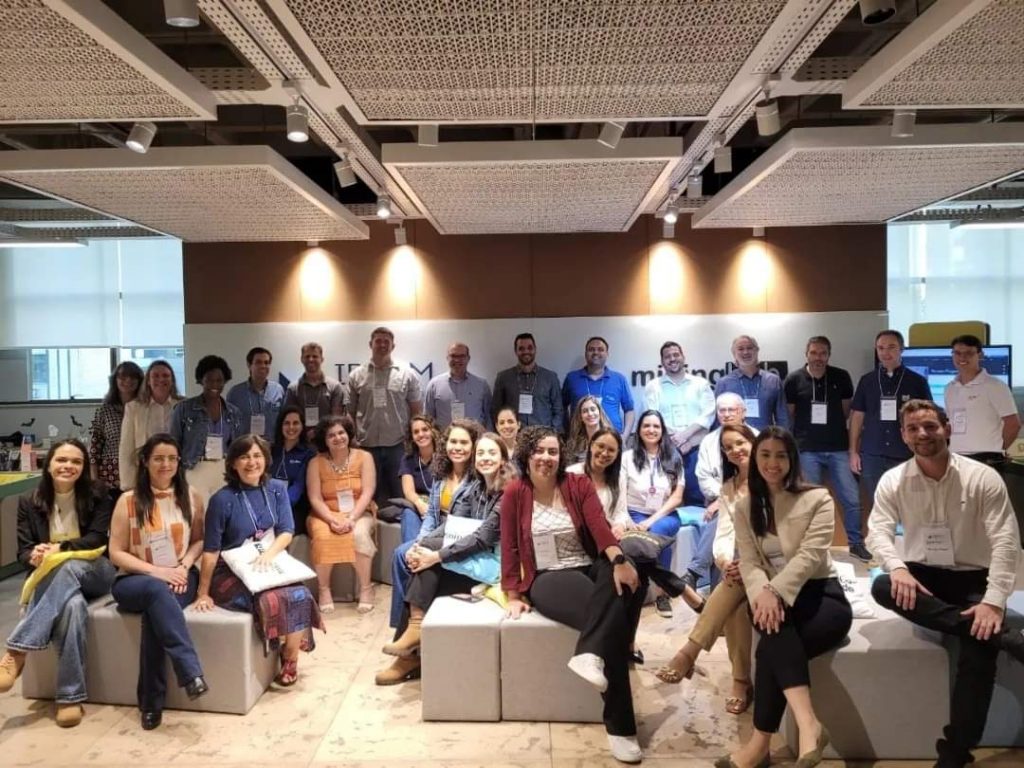
As the mining industry grapples with the complex challenges of environmental responsibility and social license to operate, Potássio do Brasil, a subsidiary of Brazil Potash, is taking a proactive stance. On November 22nd, Davidson Aquino, the company’s financial director, actively participated in the “Workshop on Mine Closure” hosted by the Brazilian Mining Institute (Ibram) at the Mining Hub in Belo Horizonte. This two-day event served as a platform for industry stakeholders to collaborate on developing a comprehensive new planning guide for mine closure, encompassing the latest national regulations, international best practices, and practical considerations for implementation.
The workshop reviewed aspects of mine closure, dedicating panels to each of the following critical areas:
- Planning: Establishing a robust framework for mine closure right from the outset, ensuring seamless integration with the overall mining project and minimizing potential environmental and social impacts.
- Future Use: Exploring innovative and sustainable post-closure scenarios for reclaimed mine sites, fostering economic diversification and community engagement.
- Social License: Recognizing the importance of obtaining and maintaining community acceptance for mining operations, with mine closure playing a vital role in building trust and ensuring long-term project viability.
- Costs: Accurately estimating and effectively managing the financial implications of mine closure, ensuring adequate resource allocation and mitigating potential economic risks.
Aquino actively engaged in discussions, sharing the company’s own experiences and perspectives on mine closure, particularly in the context of the ambitious Autazes Potash Project. For Potássio do Brasil, mine closure is not just a regulatory requirement but a strategic imperative, and part of its commitment to sustainable mining practices.
The company’s vision for the Autazes Potash Project goes beyond resource extraction. The company is planning a mine operating in harmony with the sensitive Amazonian ecosystem, leaving behind a positive legacy even after operational activities end. This commitment is reflected in the company’s detailed mine closure plan, which includes the complete removal of all facilities and the meticulous reforestation of the used surface area, transforming the once-mined land into a thriving natural habitat.
Aquino’s participation in the Mining Hub workshop underscores Brazil Potash’s proactive approach to responsible mining, and the company’s active engagement in knowledge sharing and collaborative efforts to develop best practices in mine closure.
The updated “Mine Closure Guide” developed through this collaborative initiative has the potential to serve as a valuable roadmap for the entire Brazilian mining industry, guiding companies towards more sustainable and responsible practices. As the demand for ethically sourced minerals continues to rise, Brazil Potash’s commitment to responsible mine closure positions it as a leader in the industry.
The above references an opinion and is for information purposes only. It is not intended to be investment advice. Seek a licensed professional for investment advice. The author is not an insider or shareholder of any of the companies mentioned above.

In an interview with Global Business Reports, Adriano Espeschit, President of Brazil Potash, provided an update on the company’s potash project in Autazes, located 120 km from Manaus in the Amazonas state. This underground mine, accompanied by a beneficiation plant, is significant for Brazil, a country that currently imports 98% of its potash needs. The project aims to produce 20% of the national demand for potash, and Espeschit took the time to highlight exactly what makes The Autazes Potash Project so special for Brazil and the global potash market.
Project’s Reserve and Expansion Plans
The Autazes project boasts a substantial reserve, determined through extensive exploration involving 43 rows, each over 1,000 meters. These efforts have guaranteed a production lifespan of 23 years, with an annual output of 2.2 million tons. Additionally, there are plans for expansion, potentially doubling or even tripling production in future phases.
Local Impact and Workforce
Espeschit emphasized the project’s commitment to the local community. A key aspect of this commitment is the plan to employ 80% of the workforce from the local region. This strategy includes providing necessary training to locals, equipping them with the skills required to work in the project, thereby boosting local employment and skill development.
Environmental, Social, and Governance (ESG) Goals
The project’s alignment with ESG goals is a critical element of its design and operation. The mining area, previously deforested and used for cattle grazing, will see minimal surface impact due to the underground mining approach. This method significantly reduces environmental disturbances compared to open-pit mining. The project aims for responsible waste management, with plans to reuse or backfill waste material, leaving minimal environmental footprint. The closure plan includes leaving beneficial infrastructure, like roads and ports, for community use.
Importance for Brazilian Self-Sufficiency
The project is vital for Brazil’s agribusiness, which contributes about 28-30% of the country’s GDP and is heavily reliant on imported fertilizers. The National Fertilizer Plan, aiming to increase domestic production of potash to at least 2 million tons per year by 2030, is heavily dependent on the success of the Autazes project. This project is not only crucial for Brazil’s agricultural sector but also plays a significant role in the global context, considering the increasing food production demands.
Prospects for Brazil’s Mining Industry
Espeschit highlighted the immense opportunities in Brazil’s mining sector, underscoring the need for more exploration to understand the country’s geological potential. He cited the example of the country’s vast river basin and the untapped potential in various commodities, including lithium, where recent exploration has led to significant industry growth.
Financing Strategy
The construction of the project is planned to be executed on time and within budget. The financing strategy involves a mix of equity and external financing, with the latter expected to cover around 70% of the costs. Brazil Potash, listed on the NYSE, has a diverse international investor base. Discussions are ongoing with development banks from countries where the project’s suppliers are located, highlighting the project’s global economic connections.
For more information and to read the complete interview with Global Business Reports, click here.
The above references an opinion and is for information purposes only. It is not intended to be investment advice. Seek a licensed professional for investment advice. The author is not an insider or shareholder of any of the companies mentioned above.
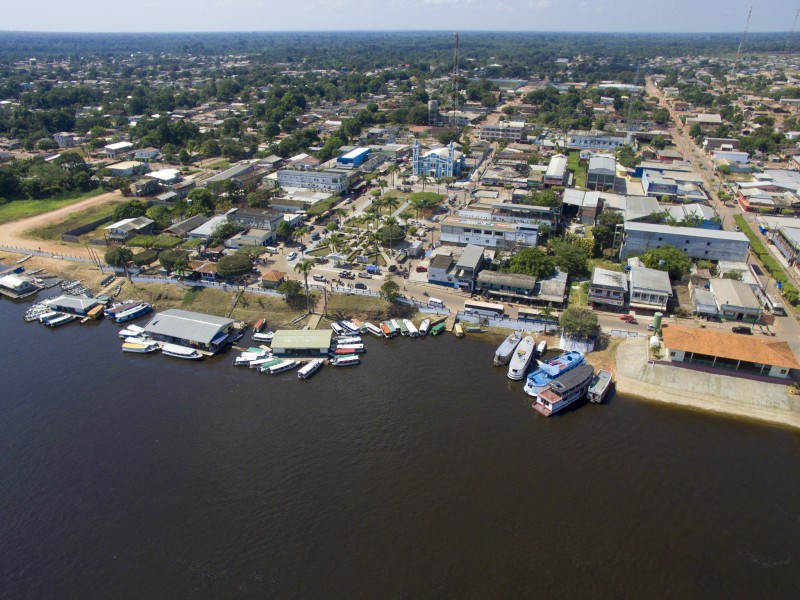
Brazil’s agricultural sector is a major factor in global food security, contributing approximately 30% to the nation’s GDP. This sector has positioned Brazil with a significant trade surplus, a trend recently highlighted by Robin Brooks, Chief Economist at the Institute of International Finance. Brooks stated, “Brazil’s massive trade surplus this year gets dismissed as an outlier event, but it isn’t. There’s been a gradual move towards bigger and bigger agricultural exports which power the trade surplus. This trade surplus isn’t an outlier. It’s a lasting transformation.”
In 2023, Brazil is poised to surpass $100 billion in agricultural exports, an amount unmatched by any other South American country. This economic strength is further strengthened by Brazil’s stable currency, high employment levels, and robust foreign exchange reserves. Despite some unresolved economic challenges, the collective efforts of Brazilian farmers, companies in the sector, and government support at federal and state levels have laid a solid foundation for wealth creation and distribution.
The global climate of instability has impacted food security and the availability and pricing of essential commodities. For Brazil, potash, a key fertilizer component, has emerged as both a strategic and vulnerable resource. Potash enhances plant resilience against drought, temperature extremes, and pests. The global potash market is largely dominated by Canada, Russia, and Belarus, who historically have supplied over 80% of the market. The Russian invasion of Ukraine and subsequent trade restrictions on Russia and Belarus led to a dramatic increase in potash prices, from $250 to over $1,200 per ton. This spike presented Brazilian farmers with not only increased costs but also the risk of interrupted potassium chloride shipments. Diplomatic efforts were made to ensure the continuity of potash supplies, which also resulted in substantial payments to Russia during its invasion of Ukraine. Had potash prices remained at $1,200, Brazil would have faced an expense exceeding $16 billion, a significant burden given the country’s extensive potash reserves.
Brazil, which imports 98% of its potash needs, has seen a tenfold increase in its usage per hectare, coinciding with increased agricultural yields. Now, Brazil possesses a world-class potash deposit in the Amazonas State, comparable to those in Canada, Russia, and Belarus – the Autazes Potash Project by Brazil Potash. This deposit, located approximately 850 meters underground, is a remnant of an ancient sea. The proposed extraction and processing techniques are similar to those used in Canada, which involve mining the ore (salt), extracting the potash, and reintegrating the sodium chloride tailings underground. This project is environmentally advantageous, particularly considering the lengthy transportation of Canadian potash to Brazil and Brazil’s predominantly renewable energy grid.
The strategic importance of this resource for Brazil and global food security is evident. However, there are potential benefits for the Mura indigenous communities near the project and who live in the state. Currently, Brazilian farmers pay royalties to indigenous communities in Canada through Canadian mining companies. Canpotex, a Canadian firm, has exported over 50 million tons of potash to Brazil, resulting in payments of approximately $17.5 billion. These royalties support community wellbeing, employment, and business opportunities for indigenous groups in Canada.
In contrast, the Indigenous Mura Council (CIM), representing 36 tribes and over 12,000 indigenous people near the Autazes potash project in Brazil, has shown support for the project following a comprehensive consultation process. The project, which is not located on a reserve, is crucial for Brazil and its agricultural sector. The benefits, including shared prosperity with the residents of Autazes, local indigenous communities, and the State of Amazonas, underscore its potential to contribute significantly to global food security.
Food security has been highlighted at the United Nations, COP28, and other global summits where world leaders have tried bringing attention to this critical issue. Now, the world will look to projects that can help secure a future with steady agriculture around the world, with potash mining and projects like the Autazes Potash Project ready to help meet those goals.
The above references an opinion and is for information purposes only. It is not intended to be investment advice. Seek a licensed professional for investment advice. The author is not an insider or shareholder of any of the companies mentioned above.
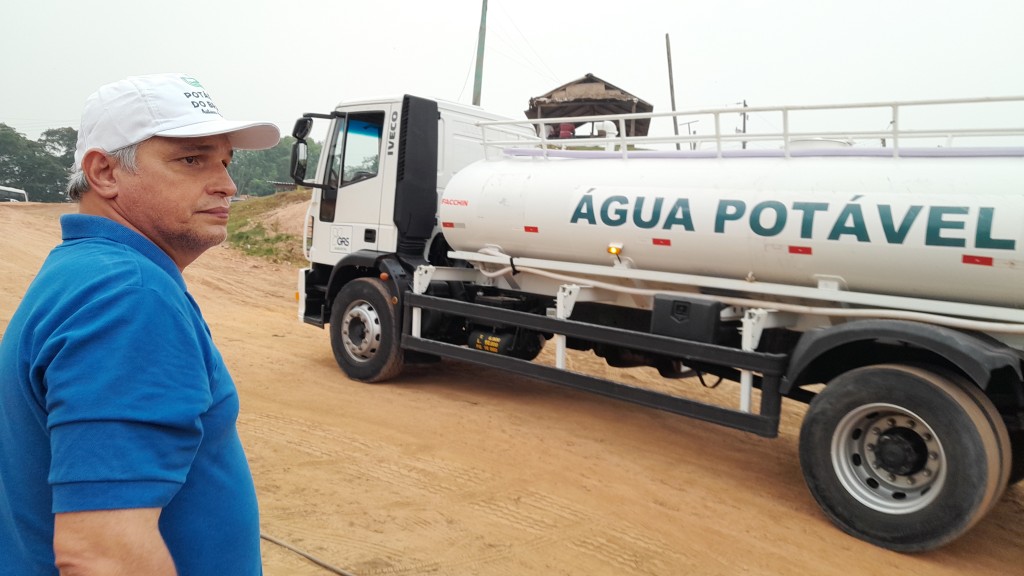
The Autazes region, located 112 kilometres from Manaus, has been experiencing a significant increase in wildfires, prompting urgent response measures to support the affected environment and assist the socially vulnerable communities nearby. In response to the intensifying fires exacerbated by the dry river season, Potássio do Brasil, a Brazil Potash subsidiary, has stepped in to provide humanitarian and environmental assistance to the municipality of Autazes.
Adriano Espeschit, President of Potássio do Brasil, commented: “This is a moment of humanitarian aid where everyone must come together for the sake of the environment and, above all, the people. We are collaborating with the community, and their issues are our concerns as well, so we are joining forces in the fight against wildfires in the municipality.”
Following a request from the Indigenous Mura Council (CIM) for clean water for the indigenous people of the 36 villages in the municipality, Potássio do Brasil supplied two water trucks to address the water shortage during the crisis. The trucks were delivered over the weekend to the CIM’s headquarters. In addition to water supply, Potássio do Brasil donated 40 sets of Personal Protective Equipment (PPE) to local firefighting teams to help ensure their safety while battling the blazes.
More than 20 firefighters are working tirelessly to control the wildfires within the rural communities of the municipality. Their efforts are part of a broader collaboration that includes the Autazes Environmental Department, Municipal Guard, Civil Defense, Traffic Department, Camera Monitoring Center (Ciops), Civil and Military Police, and the Fire Department.
Potássio do Brasil is also extending its support to the state government by providing essential food baskets for distribution to families in social vulnerability, both indigenous and non-indigenous, throughout the state.
The company, which has plans to produce potash fertilizer in Autazes, is actively involved in various socio-economic and environmental projects aimed at benefiting the local population.
The above references an opinion and is for information purposes only. It is not intended to be investment advice. Seek a licensed professional for investment advice. The author is not an insider or shareholder of any of the companies mentioned above.

Brazil Potash was a highlight and presenter at the 34th edition of the Mining-Metallurgical Symposium, held at the Federal University of Minas Gerais (UFMG). This annual event, taking place from October 23rd to the 27th in Minas Gerais, was hosted by the Grêmio of Metallurgical Engineering and Mining Engineering at UFMG. The symposium serves as a converging point for professionals and scholars to exchange insights on important matters impacting the mining and metallurgical industries.
Theme and Contributions
This year’s theme, “Industry 4.0: innovation, economy, and sustainability,” set the stage for discussions surrounding the advancement and modernization of the industry. Adriano Espeschit, president of Potássio do Brasil a subsidiary of Brazil Potash, delivered a lecture titled “Mining in/out of Indigenous Lands,” providing a deep dive into the intricacies of mining operations in sensitive areas. His talk also shed light on the challenges linked to the Autazes Potash Project in Amazonas, one of the most conscientious and eco-friendly potash projects around the world.
Davidson Aquino, the financial director at Potássio do Brasil, addressed the symposium attendees, elaborating on the critical nature of potash as a strategic mineral. Aquino’s speech emphasized potassium chloride fertilizer’s role in bolstering food security and combating hunger worldwide, alongside highlighting the strategic significance of the Autazes Potash Project for the Brazilian agricultural sector and global markets.
The Brazilian Potash Market and Potássio do Brasil’s Role
Brazil’s potash market plays a crucial role in the country’s agricultural success, given that potash is a key component of fertilizers used to enhance crop yields. Despite being one of the world’s leading consumers of potash, Brazil relies heavily on imports to satisfy its agricultural demands. This dependence makes initiatives like the Autazes Potássio Project especially important, as they represent steps toward self-sufficiency in a critical resource.
Brazil Potash has been proactively engaging with the mining community, participating in conferences and exhibitions to underscore the Autazes Potash Project’s societal benefits. The company’s active role and consistent updates on industry practices demonstrate a commitment to staying on top of mining sector trends and contributing to sustainable practices within the industry.
Industry Perspectives and Future Outlook
The discussions at the symposium highlighted a collective understanding of the need for innovative and sustainable approaches to mining, especially around projects like Autazes Potash Project, which are located in areas with delicate ecological and social balances. As the industry moves forward, the ideas and strategies stemming from these discussions are expected to shape the future of mining, particularly in regions rich in natural resources like Brazil.
The 34th UFMG Mining-Metallurgical Symposium provided a platform for Brazil Potash executives to articulate the details and strategic importance of their projects but also created a wider dialogue on the responsible and sustainable extraction of minerals in the age of Industry 4.0. As Brazil continues to develop its domestic potash resources, companies like Brazil Potash will be expected to lead, shaping the narrative for mining in the region.
The above references an opinion and is for information purposes only. It is not intended to be investment advice. Seek a licensed professional for investment advice. The author is not an insider or shareholder of any of the companies mentioned above.
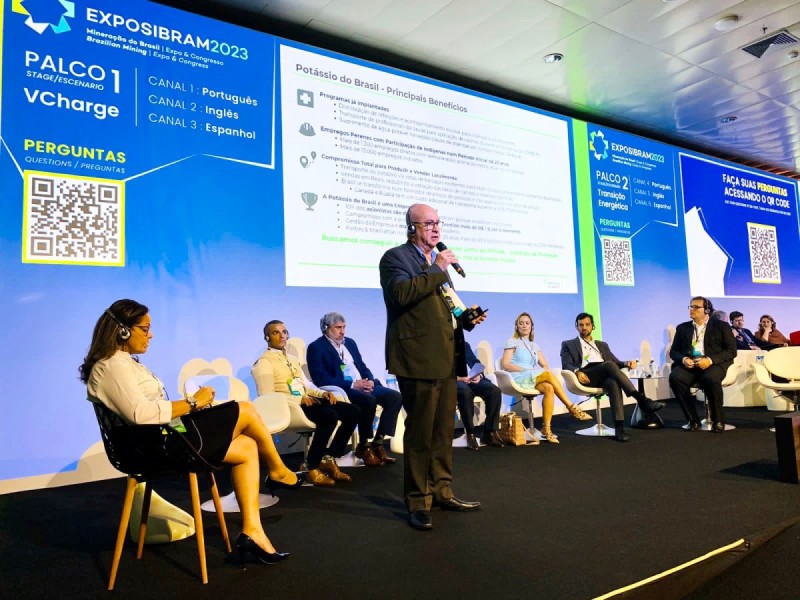
On August 30th, Adriano Espeschit, the President of Potássio do Brasil, a subsidiary of Brazil Potash, joined a panel discussion from 9:00 am to 11:00 am at the Expo & Brazilian Congress of Mining, commonly known as Exposibram. The event is taking place from August 28th to 31st at the Hangar Centro de Convenções & Feiras da Amazônia, in Belém, Pará, and is organized by the Brazilian Institute of Mining (IBRAM).
Regarded as one of Latin America’s premier mining gatherings, Exposibram aims to foster dialogue between the mining industry and broader society, focusing especially on sustainability issues. The event attracts a diverse audience including mining firms, suppliers, academic institutions, business delegations, government bodies, and entities associated with the public sector. Together, they explore the future outlook of the global mineral industry.
Topics for the lectures and discussions at Exposibram are chosen with a view to the global political and socio-economic landscape. Panels cover various aspects like business perspectives in the mineral sector, technological innovations, diversity and inclusion, social responsibility, environmental concerns, and investment trends.
This year, the conference agenda also included a speech by Espeschit during a panel titled “Public Policies for Strategic Minerals in Brazil.” The company Potássio do Brasil, which Espeschit represents, also maintains a booth at the event. Here, attendees can get acquainted with the Autazes Potash Project, an initiative planned for implementation in the municipality of Autazes in the state of Amazonas.
Brazil Potash and its subsidiary were highlighted on the opening day of Exposibram 2023. The exhibition hall, which features some of Brazil’s largest mining companies, was inaugurated by Helder Barbalho, the governor of the host city, and Raul Jungmann, the CEO of IBRAM. Davidson Aquino, the Finance and Administration Director of Potássio do Brasil, stood in for Espeschit during the opening ceremonies where discussions revolved around current scenarios and future trends in the mineral sector.
The Autazes Potash Project, showcased at the company’s stand, aims to produce potassium chloride fertilizer in Autazes, employing methods that align with Environmental, Social and Governance (ESG) criteria. This marks the second consecutive year that Potássio do Brasil has participated in Exposibram, reinforcing the company’s commitment to fostering socioeconomic development in Amazonas through sustainable and technologically advanced initiatives.
The above references an opinion and is for information purposes only. It is not intended to be investment advice. Seek a licensed professional for investment advice. The author is not an insider or shareholder of any of the companies mentioned above.

The Autazes Potash Project was spotlighted as a strategically important mineral initiative for Brazil at two recent high-profile events: the Expo & Brazilian Mining Congress (Exposibram 2023) and the International Amazon and New Economies Conference. Both conferences took place in Belém, PA, from August 28th to September 1st. Adriano Espeschit, President of Potássio do Brasil, was responsible for presenting the project. Espeschit focused on the crucial role of potash, particularly in Brazilian agribusiness, which is responsible for almost 10% of global food production.
The company initiated its presence at Exposibram 2023 with an educational booth designed to give attendees a thorough understanding of the upcoming potash fertilizer project in Autazes, AM. The company also participated in the second edition of the Canadian Breakfast Meeting where it introduced the Autazes Potash Project to suppliers involved in the mining sector. The most notable moment for Potássio do Brasil at Exposibram was undoubtedly Espeschit’s participation in a panel discussion about public policies for strategic minerals in Brazil. There, he detailed the role of the Autazes Potash Project in global food security, highlighting its grounding in Environment, Social, and Governance (ESG) principles. According to Espeschit, Potássio do Brasil has the potential to supply up to 20% of potassium chloride to the Brazilian agribusiness sector, which is significant considering that Brazil currently imports 98% of its potassium chloride.
Adriano Espeschit commented: “Potássio do Brasil can contribute up to 20% of potassium chloride supply to Brazilian agribusiness. Consumption that, in agribusiness, we are totally dependent on because we import 98%”. Our project is entirely sustainable. We will produce green potash with 80% less carbon footprint compared to projects in Canada and Russia, thanks to our Brazilian energy matrix, which is 84% renewable. By producing potash fertilizer, we are firmly committed to contributing to achieving the UN’s second Sustainable Development Goal, Zero Hunger.
Following Exposibram, representatives from Potássio do Brasil attended the International Amazon and New Economies Conference, which focused on a variety of topics including new economies, the bioeconomy, and circular economy. Over 130 companies and institutions in the mineral sector, including Potássio do Brasil, pledged to develop environmentally responsible practices to conserve the Amazon. Espeschit stated that the company’s participation and sponsorship of this event was an explicit commitment to sustainable development in the Amazon and bolstering food security globally, without causing environmental or social harm.
Notable speakers at the conference included global figures like South Korean diplomat Ban Ki-moon, former Prime Minister of Great Britain and Northern Ireland Tony Blair, and former President of Colombia Iván Duque Márquez. All emphasized the necessity of sustainable development as a means to reduce poverty. Márquez specifically invited the audience to ponder the future of new economies in the Amazon, stressing the importance of incorporating traditionally Amazon-related activities into development plans.
For context, the Expo & Brazilian Mining Congress is an annual event organized by the Brazilian Mining Institute (Ibram) and is one of Latin America’s most significant gatherings in the mineral sector. The event provides a robust platform for discussions about the mineral industry’s key scenarios and trends. The International Amazon and New Economies Conference, also coordinated by Ibram, brings together stakeholders from various sectors, including indigenous communities, academia, and both the public and private sectors, to discuss sustainable development and environmental issues. The conference aims to foster solutions that balance economic growth, inequality reduction, and conservation efforts.
The above references an opinion and is for information purposes only. It is not intended to be investment advice. Seek a licensed professional for investment advice. The author is not an insider or shareholder of any of the companies mentioned above.
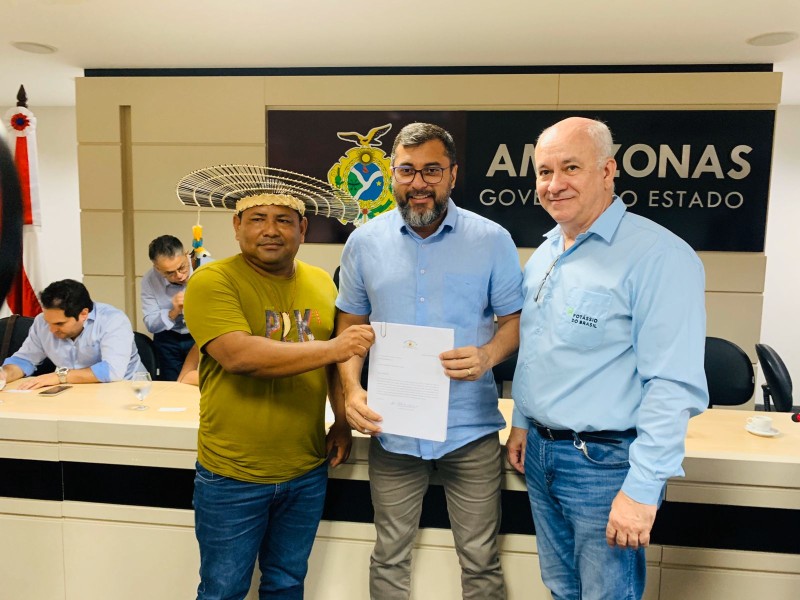
In a significant development for Brazil Potash’s Autazes potash project in the Amazonas State of Brazil, the Mura Indigenous people have voiced their support for the project. The Mura recently concluded free, prior, and informed consultations and participated in a vote which resulted in unanimous favour of the project’s construction. This decision signals a meaningful demonstration of the Mura’s wishes and is an important step in the project’s advancement.
Leaders of the Mura community from Autazes, who represent 36 villages and around 12,000 indigenous residents, made a formal visit to the Government of Amazonas’ headquarters on Monday, September 25th. During this visit, they submitted a report and record of a General Assembly meeting that took place the previous week among indigenous chiefs in Autazes. This assembly ratified the community’s decision to support the Autazes Potash Project. The event also saw the participation of Potássio do Brasil, as well as state deputies, secretaries, and the president of IPAAM, the environmental licensing agency responsible for the project.
Wilson Lima, Governor of Amazonas, commented: “This is a very important day, a historic day because we are taking a significant step towards changing the lives of the people who reside in the state of Amazonas, especially those in the municipality of Autazes. This is a fundamental step, and I consider it the most important one, which is the process of consulting the Mura people about the potassium exploration activity in the municipality of Autazes. We are talking here about another economic model for the state of Amazonas. We have the Zona Franca, which we will not relinquish, we have the natural gas issue, which we have already made significant progress on, and the next step is the potassium matter.”
José Cláudio dos Santos Pereira, the general coordinator of the Indigenous Mura Council (CIM), said, “For us, this is very important because it represents the future, the economic progress of Autazes and the state of Amazonas. But it is important to emphasize that the Mura people understand that we are working alongside the Federal Justice, and we do not intend to challenge it. We understand that IPAAM is the licensing authority and should proceed with the process.”
Adriano Espeschit, the president of Potássio do Brasil, weighed in on the importance of the project to global food security and ending world hunger: “This is a new moment for Autazes, for Amazonas, for Brazil, and why not say it for the world, as food security depends on fertilizers for agriculture, to feed people and eradicate hunger in our world. As President Lula said at the opening of the UN Assembly, over 750 million people are suffering from hunger. This is a strategic project to end world hunger. We will work on the next steps to advance licensing and begin the project’s installation in Autazes.”
Governor Wilson Lima of Amazonas stated that the Mura people’s endorsement is pivotal not only for the Autazes municipality but also for the broader Amazonas region. He mentioned the possibility of establishing a new economic model for the state based on this support. José Cláudio dos Santos Pereira, the general coordinator of the Indigenous Mura Council (CIM), represented the Mura community during this occasion. He presented a letter and a report from the General Assembly, confirming that indigenous leaders have accepted the project’s implementation.
The meeting also included several key figures alongside the indigenous leaders. These individuals included the president of Potássio do Brasil, state deputies, and state secretaries overseeing Economic Development, Science, Technology, and Innovation, Mining, Gas, and Energy, as well as the President of the Amazonas Environmental Protection Institute (Ipaam) and the mayor of Autazes.
While the project is not situated on indigenous land, it falls within 10 kilometres (around 6 miles) of two indigenous reserves. These communities hold the legal right to consultation in accordance with International Labour Organization 169 protocols. The Mura people had the autonomy to determine which tribes would be consulted, as well as the format for consultation and vote support threshold. A series of gatherings were conducted to inform the Mura about the project’s potential impacts and benefits. Ultimately, consultations took place with 36 tribes, some located as far away as 70 kilometers (about 45 miles) from the project site. A vote was organized with the participation of over 200 Mura individuals, culminating in a positive outcome in favor of the project.
The Mura community stands to gain various benefits from the development of the Autazes Potash Project. These benefits include opportunities for direct employment, funding for new businesses that can contribute to the project and local community, and the initiation of several programs aimed at improving general well-being as dictated by the Mura’s wellness program.
It’s worth noting that Brazil Potash still awaits a review from Brazil’s government Indigenous people’s agency, FUNAI, concerning the Company’s Indigenous Consultation Study (the “ECI”). This review is one of the final steps necessary for obtaining the Installation License needed to commence project construction. The Mura’s informed and positive vote undoubtedly sends a constructive signal to FUNAI, emphasizing the community’s wish for the project to proceed and for the necessary permits to be granted.
The above references an opinion and is for information purposes only. It is not intended to be investment advice. Seek a licensed professional for investment advice. The author is not an insider or shareholder of any of the companies mentioned above.
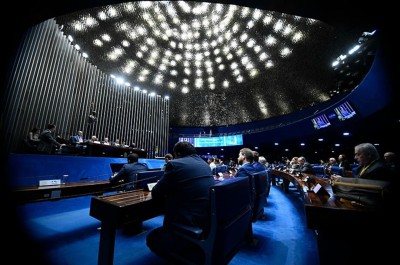
On August 6th, the Brazilian Senate held an important debate regarding “Fertilizers in Brazil”. Although Brazil has the potential to become the world’s foremost fertilizer producer, the nation produces only 20% of its fertilizer needs. Brazil’s current dependency on the international market has led to an alarming reliance on importing at least 80% of the fertilizers required for enhancing the quality and productivity of its crops.
Senator Laércio Oliveira (PP-SE) voiced concerns over Brazil’s susceptibility to global events, citing the ongoing conflict between Russia and Ukraine, which has heightened the country’s dependence on foreign fertilizers and adversely affected its economy. He emphasized the pressing need to diversify imports and explore other nations as potential suppliers. Furthermore, Senator Oliveira pointed out that Russia accounts for 23% of Brazil’s fertilizer imports, with Brazil expending approximately US$ 15 billion on fertilizer imports in 2021 alone.
National Fertilizer Plan: A Vision for the Future
Senator Oliveira advocated for the National Fertilizer Plan, which ambitiously aspires to slash Brazil’s dependence on foreign fertilizers to about 50% by 2050. Alongside this, Senator Oliveira proposed the Fertilizer Industry Development Program, a project he pioneered. This project, as elucidated by Senator Eduardo Gomes (MDB-TO), intends to invigorate the domestic production of fertilizers by offering incentives to companies in the sector to invest in machinery, equipment, services, and the establishment of new factories.
The Need for National Production and Diversification
The emphasis on increasing national production resonated with many senators. Senator Angelo Coronel (PSD-BA) highlighted the current imbalance, with Brazil importing 8% of the world’s total fertilizer production but generating only 20% of its domestic consumption. Senator Mauro Carvalho Junior (União-MT) touched upon the environmental challenges linked to potassium chloride production, a fertilizer staple in Brazilian agriculture. He stressed the significance of supporting the entire productive sector, recognizing its role in employment and economic growth.
Natural Gas: A Key Component in Fertilizer Production
Rodolfo Saboia, the general director of the National Agency of Petroleum, Natural Gas, and Biofuels (ANP), underlined that fertilizer production heavily relies on natural gas. He acknowledged the challenges of ensuring affordable gas prices but assured the agency’s commitment to enhancing natural gas supply at competitive prices.
Several representatives from multiple national ministries weighed in on the importance of fertilizers for Brazil. Vitor Eduardo de Almeida Saback, from the Ministry of Mines and Energy, emphasized that fertilizers, especially NPK (nitrogen, phosphate, and potassium), are crucial for improving agricultural productivity. Bruno Santos Abreu Calligaris, from the Ministry of Development, underscored the necessity for Brazil to innovate and adapt fertilizer technology to its unique tropical environment, aligning with sustainability and environmental preservation.
Brazil Potash and the Autazes Potash Project: A Step Towards Self-Reliance
Brazil Potash stands out as a major step in Brazil’s quest to reduce its reliance on potash imports. The potash mining company, strategically located, aims to curtail Brazil’s over 95% dependence on potash imports, offering a sustainable alternative for a country that has predominantly relied on overseas potash supplies.
Its flagship venture, the Autazes Potash Project, situated 120 km southeast of Manaus, is a testament to Brazil Potash’s commitment. With the endorsement of the Brazilian government, this project has the potential to cater to 20% of Brazil’s potash requirements. Utilizing 85% renewable energy resources, the project endeavours to mitigate carbon emissions and minimize environmental implications.
Central to Brazil Potash’s operation is the potash extraction process, extracting potash from depths of 800 meters and refining it into fertilizer that fortifies soil and augments agricultural productivity. The company’s efforts are intrinsically tied to ensuring nutritious food reaches consumers.
Emphasizing sustainable growth, Brazil Potash establishes strong ties with communities, public agents, and NGOs. Their commitment to environmental preservation and indigenous rights is evident in the meticulous preliminary environmental studies conducted for the Autazes Potash Project.
By welcoming investors aligned with its vision, Brazil Potash hopes to challenge the existing Canadian-Russian potash duopoly, signalling a transformative phase in Brazil’s potash sector.
A Need to Bolster Domestic Production Quickly
Brazil’s current dependency on foreign fertilizers underscores the importance of bolstering domestic production and seeking alternative international suppliers. The initiatives proposed by Senator Laércio Oliveira and the promise of projects like the Autazes Potash Project by Brazil Potash are important steps toward guaranteeing Brazil’s agricultural sector thrives without compromising its economic and environmental interests.
The above references an opinion and is for information purposes only. It is not intended to be investment advice. Seek a licensed professional for investment advice. The author is not an insider or shareholder of any of the companies mentioned above.
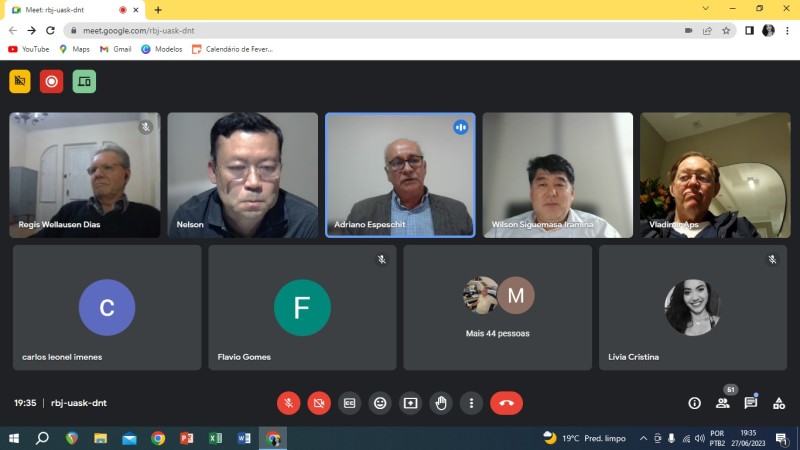
Adriano Espeschit, the President of Potássio do Brasil, recently provided an insightful lecture on “Potassium Mining in the Amazon – Food Security for Brazil and the World” as part of the 2023 lecture cycle of the Associação Paulista de Engenheiro de Minas (APEMI). The focus of his discussion was the Autazes Potassium Project, which is currently under the environmental licensing process.
The Autazes Potash Project, under the umbrella and management of Brazil Potash, is located in the Amazonas region. The project has substantial potential to revolutionize Brazil’s potash landscape. Targeting potash, a vital mineral for producing potassium-rich fertilizers, the project has the capability to produce an estimated 2.2 million tonnes annually when fully operational.
The strategic location of the project, the proximity to major farming regions, and access to renewable energy sources equip the project for success. It offers the opportunity to reduce Brazil’s reliance on imported potash while also boosting local and national economies through job creation and revenue generation.
Consultation and Consent Protocol
Espeschit highlighted the consultation and consent protocol involving the indigenous Mura de Autazes and Careiro da Várzea people. The protocol comprises seven steps to inform the Autazes community and the region about the Potássio project. Currently, the project is transitioning through the third and fourth steps of this phase.
Impact on Agribusiness and Regional Development
The Autazes Potash Project promises significant benefits to Brazilian agribusiness and the regional development where it will be established. Espeschit emphasized the potential reduction of fertilizer imports, crucial for the country’s agricultural sector. Moreover, the project will contribute to regional infrastructure development, including paving the connecting road between Vila de Urucurituba and Lago de Soares and constructing a port near Vila de Urucurituba in Autazes.
Espeschit also shed light on the potassium chloride extraction process and the underground mining method using chambers and pillars.
Socioeconomic and Environmental Commitments
Potássio do Brasil has committed to hiring 80% of local labor, thus promising substantial job creation for the local community. Moreover, the company plans to implement over 30 socioeconomic-environmental projects in Autazes.
Espeschit reiterated the company’s environmental responsibility, promising no residues left on the surface of the project. Moreover, there’s a commitment to reforest an area ten times larger than that used for the implementation of the enterprise, demonstrating a solid commitment to environmental sustainability.
Nourishing Communities and Promoting Sustainable Agriculture
Beyond its mining activities, Brazil Potash is committed to transforming the lives of residents in the communities where it operates. The company has made considerable contributions to tackle food security issues in many parts of Brazil. During the COVID-19 pandemic, large quantities of food were donated to the local communities surrounding the Autazes Potash Project.
In addition to addressing immediate food security needs, Brazil Potash has also demonstrated commitment towards promoting sustainable agriculture within these communities. The company recently donated over 5,000 seedlings grown in their nursery located in the Urucurituba village in the Autazes municipality to the Amazonas state government. This initiative not only boosts rural production and promotes food security, but it also contributes to climate change mitigation by sequestering greenhouse gasses.
The Future of Potash Mining
Espeschit’s insightful discussion at APEMI’s lecture series underlined the Autazes Potash Project’s potential in revolutionizing the potash landscape in Brazil. The project’s substantial benefits extend from agribusiness to local communities and sustainability initiatives. As the project navigates through its licensing phase, it has the potential to contribute to Brazil’s potash self-sufficiency, job creation, and socio-environmental development.
The above references an opinion and is for information purposes only. It is not intended to be investment advice. Seek a licensed professional for investment advice. The author is not an insider or shareholder of any of the companies mentioned above.
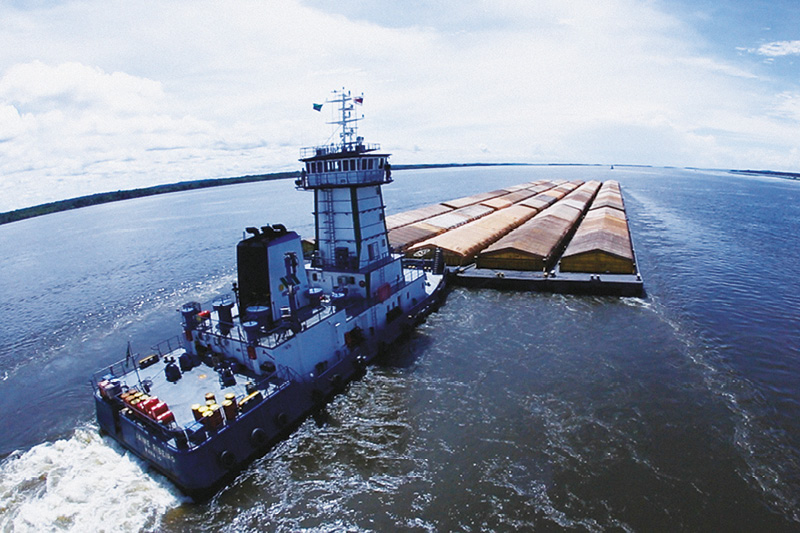
Brazil Potash’s Autazes project, located in the Amazonas region, has the potential to significantly alter the country’s potash landscape, and is progressing toward production every day. The project’s main focus is on potash, an essential mineral for the production of potassium-rich fertilizers. The region’s potash reserves are estimated to be vast, with the potential to produce 2.2 million tonnes annually once the project is fully operational.
The Autazes Potash project’s strategic location, with access to an abundant renewable energy source and proximity to major farming regions, makes it uniquely positioned for success. It could not only alleviate the country’s reliance on imported potash, but also contribute to the local and national economy via job creation and increased revenues.
The Consultation Process and Installation License
The installation license, a pivotal step towards the project’s materialization, has been a focus for the Brazil Potash management. This license is necessary to commence project construction. Its acquisition involves a multi-step consultation process with various stakeholders, including the local communities, environmental agencies, and governmental bodies.
Recently, the President of Brazil’s Federal court (TRF-1) ruled to reinstate Brazil Potash’s Preliminary (Social and Environmental) License, a crucial milestone in obtaining the Installation License. This indicates the government’s willingness to back projects that could contribute to the country’s self-sufficiency in critical sectors and stimulate economic growth.
Impact on Local Communities
One of the main benefits of the Autazes Potash Project is its far-reaching and positive impact on local communities. Brazil Potash is not just focused on mining potash; it is committed to transforming the lives of the residents in the communities where it operates.
Nourishing Communities
Food security is a significant issue in many parts of Brazil, and Brazil Potash is helping to combat this issue through various initiatives. The company has donated large quantities of food to the local communities surrounding the Autazes Potash Project during COVID 19. These donations help to alleviate immediate food security concerns, and they also foster goodwill and trust between the company and the communities in which it operates.
Fostering Sustainable Agriculture
In addition to addressing immediate food security needs, Brazil Potash is also invested in promoting sustainable agriculture within these communities. The company recently donated over 5,000 seedlings to the Amazonas state government, grown in their own nursery located in the Urucurituba village in the Autazes municipality. These seedlings, which include a variety of fruit, forest, ornamental, and medicinal plants, are intended to boost rural production, promote food security, and contribute to combating climate change by sequestering greenhouse gasses.
This initiative aligns with Brazil Potash’s commitment to sustainability and environmental stewardship. It also empowers local farmers by providing them with resources to enhance their livelihoods in a sustainable manner.
Infrastructure Development
Brazil Potash understands the importance of robust infrastructure in community development. That’s why the company has donated construction materials to local municipalities, contributing to the development of community infrastructure. These materials have facilitated the construction and repair of facilities, enhancing the overall quality of life for local residents.
Job Creation and Economic Stimulation
Perhaps the most profound impact of the Autazes Potash Project will be its contribution to local economies through job creation. Brazil Potash has committed to employing local residents in the project, thereby creating a significant number of job opportunities in a region where employment options might otherwise be limited.
In addition to direct employment, the project is also expected to stimulate other sectors of the local economy indirectly. For example, the influx of workers and economic activity surrounding the project could increase demand for local goods and services, benefiting a wide range of businesses and stimulating economic growth in the region.
Potential for a Better Future for Brazilian Agriculture
Brazil’s agriculture sector is expected to benefit from the Autazes Potash project. Potash, a major component of fertilizers, plays a critical role in enhancing soil fertility and crop yield. However, Brazil imports most of its potash requirements, primarily from Canada, Russia and Belarus.
With the Autazes project, Brazil could reduce its dependency on foreign potash, ensuring a stable, locally sourced supply. This could translate to cost reductions for Brazilian farmers due to decreased transportation and import costs. Furthermore, it could lead to a more sustainable and resilient agricultural sector, less susceptible to global supply chain disruptions.
The country has also been receptive to Autazes because the project aligns with Brazil’s efforts towards environmental sustainability. Brazil Potash has a strong focus on environmental, social, and governance (ESG) practices, as demonstrated by its ‘A’ rating from Morgan Stanley Capital International (MSCI). The company also recently donated over 5,000 seedlings to the Amazonas state government, further solidifying its commitment to community development and environmental conservation.
Brazil Potash’s Autazes project, with its vast potential, is poised to redefine the country’s agricultural landscape. It signifies a promising future for Brazilian agriculture, underpinned by sustainability, self-sufficiency, and improved economic prospects. As Brazil Potash continues its journey, the global potash industry and the world are closely watching, with great anticipation, for the beginning of a new era in potash production and global food security.
The above references an opinion and is for information purposes only. It is not intended to be investment advice. Seek a licensed professional for investment advice. The author is not an insider or shareholder of any of the companies mentioned above.

The first half of 2023 has been a whirlwind of activity for the management of Brazil Potash, and on June 5, 2023, the company provided a shareholder update. Notably, their efforts have garnered robust support from Brazil’s newly established federal government and considerable interest in the remaining potash offtake rights. The momentum was underscored by a keynote panel speech delivered at the International Fertilizer Association (IFA) annual conference.
The conference, attended by a crowd of over 1,500, included the top executives of major fertilizer companies worldwide. Among the distinguished participants was Matt Simpson, Brazil Potash’s CEO. His keynote address emphasized the significance of “building sustainable supply chains to ensure food security,” with particular emphasis on the concept of “selective globalization.” This suggests that domestic production of certain essential goods should be prioritized to guarantee supply availability.
Simpson’s remarks bear particular relevance to Brazil, a country recognized as one of the globe’s most prolific agricultural exporters, with an output exceeding US$110 billion per annum. Given its vast freshwater resources, fertile land, and a climate suited for year-round crop cultivation, Brazil’s role in global food security is set to expand in tandem with global population growth. However, it faces a vulnerability in importing over ~98% of its potash needs, primarily from Canada, Russia and Belarus, despite housing one of the world’s largest basins.
This message has resonated with Brazilian governmental bodies, as evidenced by recent public declarations of support from influential figures like Vice President Geraldo Alckmin, Governor of Amazonas Wilson Lima, and Mayor of Autazes Andreson Cavalcante. Their backing has catalyzed the progression of the licensing process, leading to a ruling by the President of Brazil’s Federal court (TRF-1) to reinstate Brazil Potash’s Preliminary (Social and Environmental) License. This is considered a crucial forward stride toward obtaining the Installation License required to commence project construction.
Simultaneously, Brazil Potash has been engaging in discussions with several esteemed companies to secure long-term take or pay contracts for an additional 1.5 million tonnes, with an eye on equity investment. This is part of their strategy to assure banks providing debt financing of credible counterparties interested in purchasing their potash and agreeing on price terms. The remaining 200,000 tonnes of annual production is projected to be reserved for spot sales, ensuring production flexibility.
Brazil Potash has also prioritized its Environment, Social, and Governance (ESG) strategy, a testament to which is the completion of work that can be reviewed on the Company’s website. Morgan Stanley Capital International (MSCI), a respected third party, reviewed and rated the company’s policies and actions, awarding them an ‘A’ rating. This places Brazil Potash in the top quartile of their producing peers, underscoring their commitment to leadership in this domain.
In the quest to drive the project’s development, Brazil Potash has been meticulously working towards forming a robust board of directors with industry and thought leaders. More information on this will be shared in future shareholder updates.
Even as Brazil Potash celebrates the progress of key initiatives, its focus remains unwavering on obtaining licensing and strengthening its community presence. The company is committed to contributing significantly to global food security and, crucially, delivering robust shareholder returns.
The above references an opinion and is for information purposes only. It is not intended to be investment advice. Seek a licensed professional for investment advice. The author is not an insider or shareholder of any of the companies mentioned above.
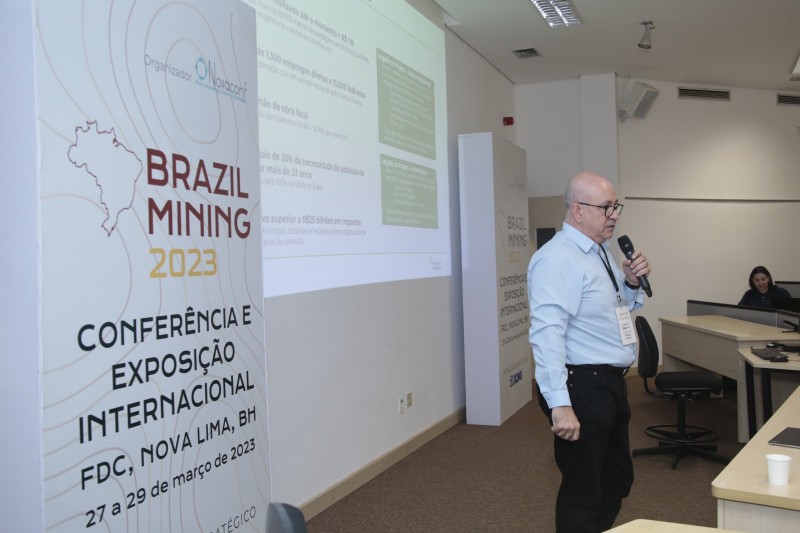
At the Brazil Mining 2023 International Conference and Exhibition held in Nova Lima, Adriano Espeschit, president of Potássio do Brasil (PdB), a subsidiary of Brazil Potash (BPC) delivered a lecture on “Food security: Brazil and global potash demand.” The conference, organized by Novaconf, attracted roughly 70 participants from various fields in the mining industry to discuss innovations, forge partnerships, and explore investment projects in Brazil.
Potássio do Brasil’s attendance at the conference aimed to showcase the Potássio Autazes Project and emphasize its significance for Brazil’s agricultural sector. Espeschit highlighted that the project would be “a milestone in the productive sector in Brazil” by bolstering agribusiness and providing food security. Furthermore, it would promote sustainable development in Autazes, the municipality where the project will be implemented.
The company is currently awaiting the Installation License (LI) from the Instituto of Environmental Protection of Amazonas (Ipaam) to begin constructing facilities and extracting potassium chloride from the sylvinite mine in Autazes, located 112 km from Manaus. The company has already received the Preliminary License (LP) from the same organization.
At a recent meeting of the Board of Directors of the Superintendence of the Manaus Free Trade Zone (Suframa), Vice President of the Republic and Minister of Development, Industry, Commerce and Services (Mdic), Geraldo Alckmin, pledged the government’s support for the project. Brazil is a leading global food producer and a major importer of fertilizers, particularly potassium chloride. Espeschit revealed that Brazil imports 98% of the potassium used in its agriculture.
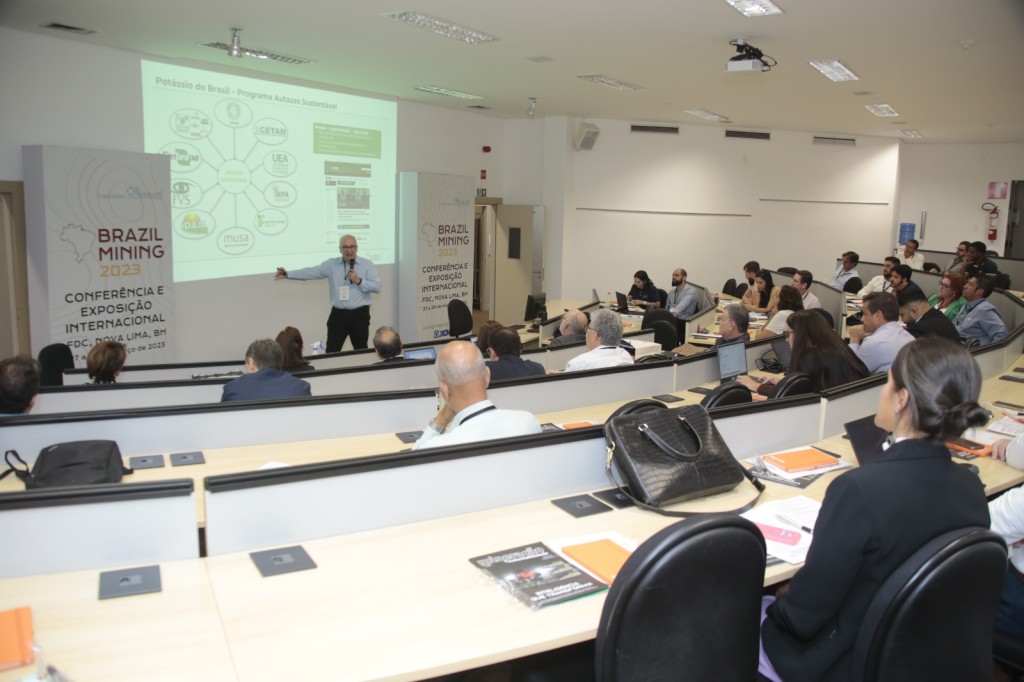
Espeschit added that potassium would be extracted 800 meters underground and the company’s facilities would be built on previously used pastureland, avoiding deforestation of native forests. He emphasized the company’s commitment to reforesting an area ten times larger than the one occupied by its facilities.
The above references an opinion and is for information purposes only. It is not intended to be investment advice. Seek a licensed professional for investment advice. The author is not an insider or shareholder of any of the companies mentioned above.
In an effort to further its mission of community development and environmental sustainability, Brazil Potash, through its subsidiary, Potássio do Brasil, has generously provided 5,766 seedlings of various kinds to the Amazonas state government. The seedlings, which include fruit, forest, ornamental, and medicinal varieties, were cultivated in the company’s nursery situated in the Urucurituba village in the Autazes municipality.
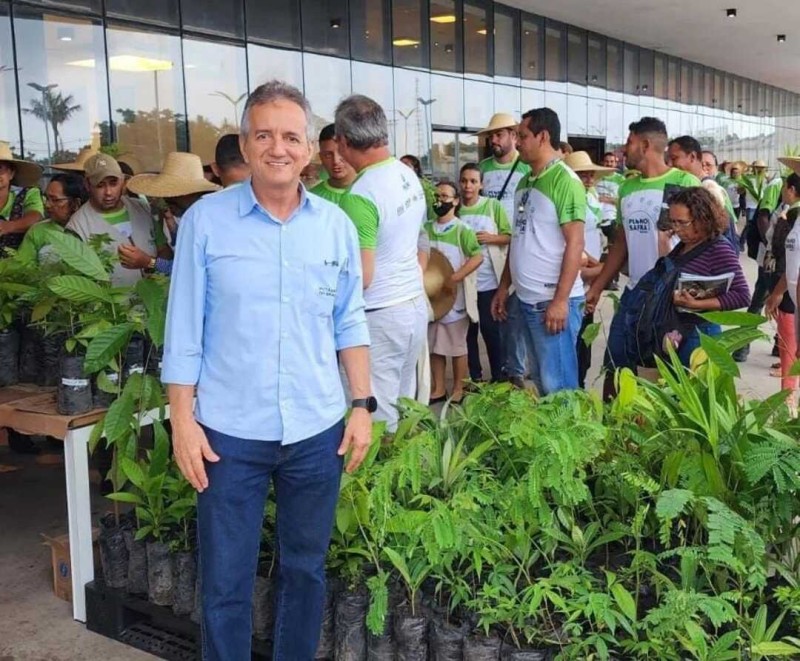
The handover took place on May 5th during the inauguration of the 2023-2024 Crop Plan at the Vasco Vasquez Convention Center. This initiative is set to uplift over 1,200 small-scale farmers in the Manaus Metropolitan Region and beyond, extending its reach to various municipalities within the Amazonas interior.
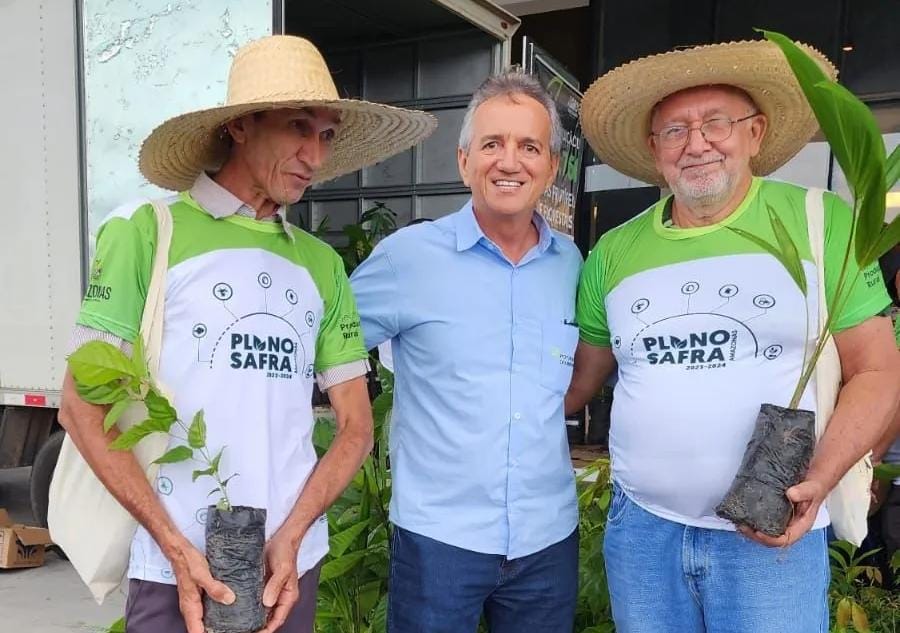
Representing Potássio do Brasil at the event, ESG director Lúcio Rabelo elaborated on the intent behind the donation. In line with the goals of the Autazes Potash Project, he highlighted the company’s commitment to bolster rural production, enhance food security, and mitigate climate change by sequestering greenhouse gases. Additionally, he emphasized on their strategy to safeguard water resources, rehabilitate degraded lands, and restore local biodiversity.
This move mirrors Potássio do Brasil’s commitment to align with the State Government’s efforts to confront the global climate crisis, reflecting its corporate ethos of contributing positively to the community.
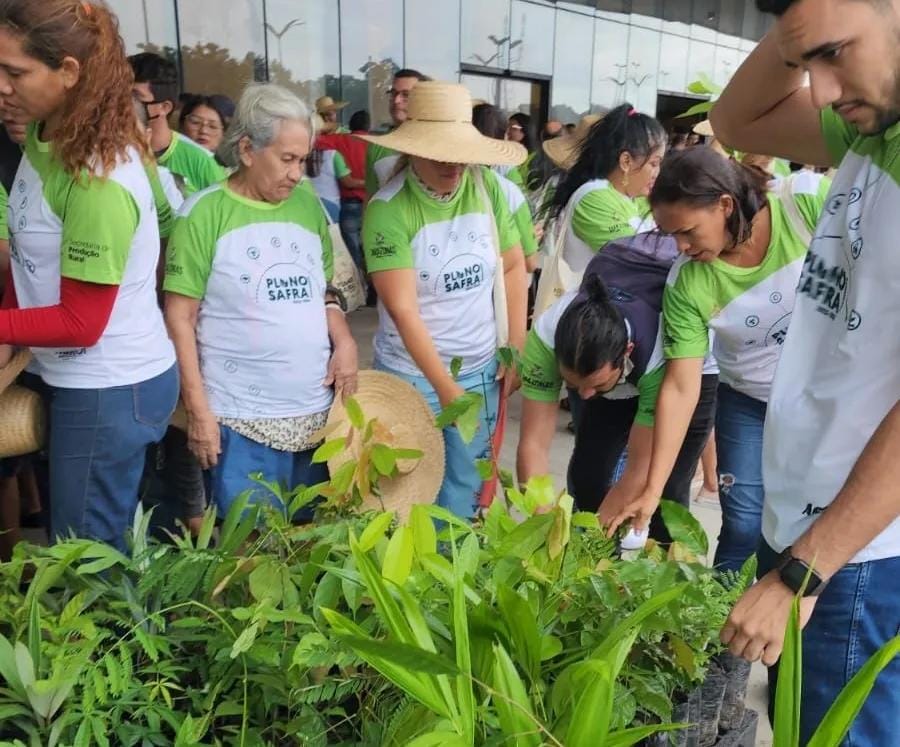
Notably, the Urucurituba nursery, established in 2021, has already yielded over 42,000 seedlings representing 55 different agroforestry species. This substantial output underpins the company’s dedication to fostering a sustainable future, a key aspect of Brazil Potash’s mission and a cornerstone of the Autazes Potash Project.
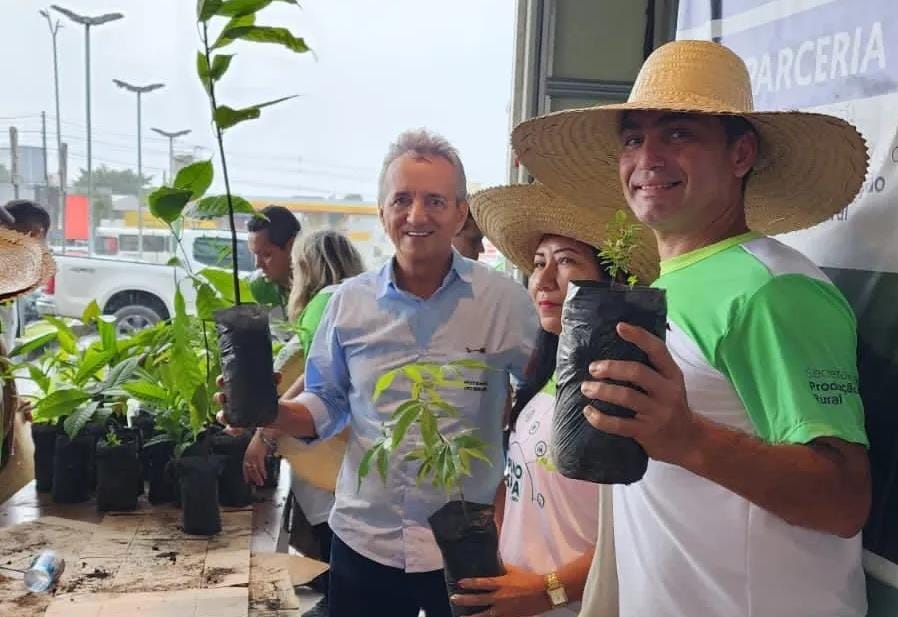
The above references an opinion and is for information purposes only. It is not intended to be investment advice. Seek a licensed professional for investment advice. The author is not an insider or shareholder of any of the companies mentioned above.

Brazil Potash is set to invest US$2.5bn in its Autazes potash project in Amazonas state, a significant step for the company and its flagship potash project. The project aims to extract and process sylvinite for the production of potassium chloride with a capacity of 2.2Mt/y. The Autazes project will be located 112km from Manaus, Amazonas state, and is expected to produce 20% of the volume consumed through Brazilian crops. The Autazes potash project is moving closer to approval and the inevitable and significant investment that will come with it, approaching the point where the company will begin to monetize the project through multiple channels and strategies.
Licensing and Financing Strategies
The project has already received the preliminary license issued by Amazonas’ environmental authority, Ipaam. The installation license from Ipaam is the only one remaining, and the company expects news regarding its licensing this year to begin building the project. Brazil Potash plans to invest US$2.5bn in the project and is working on several fronts in relation to funding.
The company has signed an offtake agreement with Brazilian agricultural conglomerate Amaggi, agreeing to buy 500,000t/y of the production for at least 15 years, helping the company in its search for financing. Brazil Potash has also received positive feedback from the development bank BNDES and is talking to other international development banks. The company is in talks with potential suppliers from Europe, North America, and China to purchase equipment.
Energy Supply and Logistics
To address the energy supply issue, Brazil Potash will build a 165 km transmission line to connect the project to the national grid. This will benefit the local population of around 200,000 people who currently use diesel oil to generate power for their homes. The project has an agreement with Hermasa from Amaggi group, which will deliver the product to ports in the region for logistics.
Importance of Investment in the Potash Mining Industry
Potash mining plays an essential role in agriculture as it is a vital element in the production of fertilizers. The Autazes project will produce a relevant amount of potassium chloride, which corresponds to 20% of the volume consumed through Brazilian crops. Potash mining in Brazil has been lagging behind other countries, and the Autazes project’s success will encourage more investment in the industry. Brazil Potash is committed to engaging local communities and indigenous peoples of the region, with the goal of having around 80% of the region’s people in its workforce.
With positive indications from development banks and an offtake agreement with a major agricultural conglomerate, Brazil Potash is well-positioned to move forward with the project and deliver the biggest new potash project in decades.
The above references an opinion and is for information purposes only. It is not intended to be investment advice. Seek a licensed professional for investment advice. The author is not an insider or shareholder of any of the companies mentioned above.
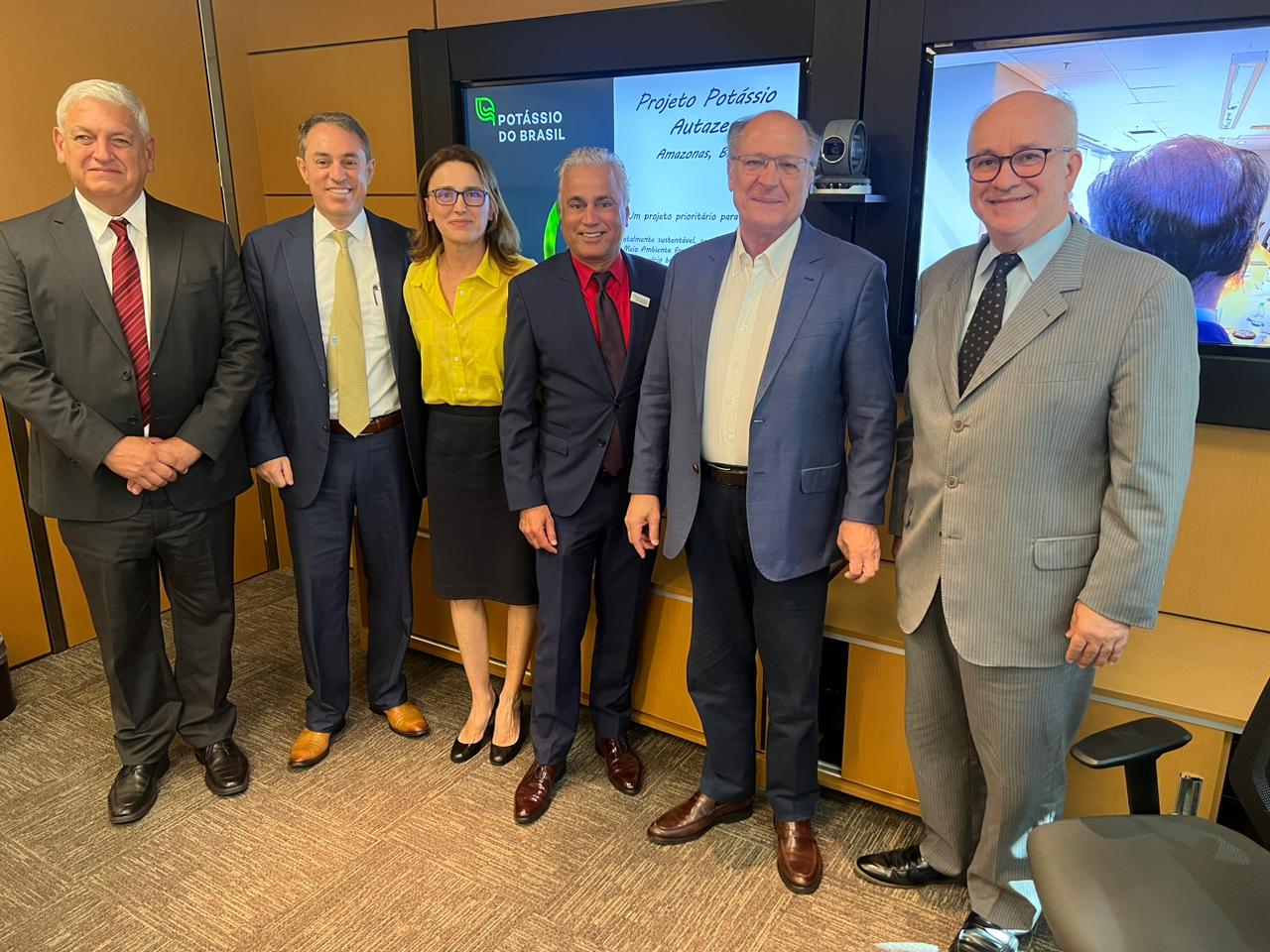
Potássio do Brasil’s President, Adriano Espeschit, and Chairman of Brazil Potash, Stan Bharti, recently presented the Autazes Potash Project to the new management of the Federal Government on March 3, 2023. The project was presented in Brasília to the Minister of Agriculture and Livestock, Carlos Fávaro, and his technical team, as well as to the Minister of Mines and Energy, Alexandre Silveira. The aim of the presentation was to seek the government’s support for the project, which will be implemented in the municipality of Autazes in the state of Amazonas.
The Autazes Potash Project is set to contribute significantly to Brazil’s self-sufficiency in the production of potash, a key component in fertilizer production. The project aims to extract 2.5 million tons of potash per year, which will be used domestically.
In a meeting with the Vice President of Brazil, Geraldo Alckmin, the Autazes Potash Project was presented by Espeschit, Bharti, and other members of the company’s board of directors. Alckmin, who is also the Minister of Development, Industry, Commerce and Services, praised the project and emphasized the need to strengthen the fertilizer industry in Brazil.
The Autazes Potash Project will also bring economic benefits to the region, providing job opportunities and boosting local infrastructure. The project will require an investment of approximately US$2.5 billion and is expected to generate over 5,000 direct and more than 10,000 indirect jobs during its construction and operation phases.
The Autazes Potash Project has already undergone extensive feasibility studies, and Potássio do Brasil is close to obtaining all the necessary environmental licenses to begin construction. The project will utilize the latest mining technologies and sustainable practices, including the use of renewable energy sources to power the operations.
The president of Potássio do Brasil, Adriano Espeschit, expressed his excitement about the project and the potential it holds for Brazil’s economy and environment. He also invited the Vice President, Geraldo Alckmin, to visit Autazes and see firsthand the positive impact the project will have on the region.
The Autazes Potash Project is set to become a significant contributor to Brazil’s fertilizer industry and a key player in the global potash market. The project’s successful implementation will help reduce Brazil’s dependence on foreign countries for potash and strengthen the country’s position as a leading producer of agricultural products.
The above references an opinion and is for information purposes only. It is not intended to be investment advice. Seek a licensed professional for investment advice. The author is not an insider or shareholder of any of the companies mentioned above.
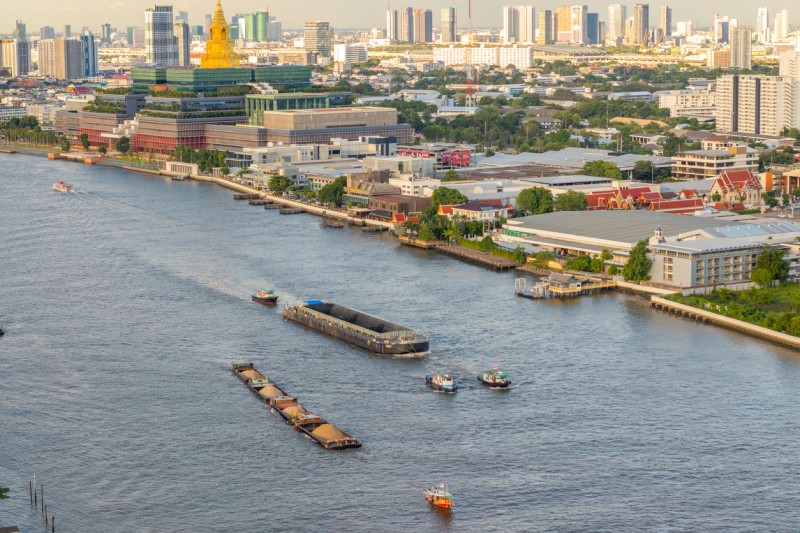
Brazil Potash’s Autazes Potash Project promises to be one of the biggest mining investments in Brazil in years, with the company intending to invest $2.5 billion immediately once it obtains its installation license. To prepare, the company has been busy signing offtake agreements to secure the funding when it is needed.
The project financing will rely on the company having advance sales contracts with renowned clients, which Brazil Potash has already begun to do with Amaggi. The first contract with Amaggi was for the purchase of 500,000 tonnes, with a second agreement negotiating the remainder of the mine’s potential of 1.9 million tonnes.
The proposed output for the Autazes Potash Project is also significant because the company plans to double the production numbers. Currently, consultation work is ongoing with the Mura Indigenous group, and is one of the final steps before the company is able to obtain the installation license.
The Changing Potash Market
Three key countries have dominated the potash market in the past: Canada, Belarus, and Russia. This has created issues for food security and pricing stability as the three countries have a monopoly on the market. Brazil Potash’s Autazes Potash Project has the potential to change this, with the company’s CEO, Adriano Espeschit, stating that the project will have a major impact on the global potash market.
The Autazes Potash Project will also add to the diversity of potash production and break up the current monopolistic structure. This could lead to more competitive pricing for potash and create more stability for the market. In addition, the project has the potential to provide jobs and economic growth in the region, as well as stimulate the Brazilian economy.
Beyond the economic impact, the project is a sustainable engineering investment that will produce potassium chloride, an extremely important fertilizer. Brazil is a major agricultural producer, and the Autazes Potash Project could help to ensure that the country has access to the potash it needs for its crops. With current food prices at all-time highs around the world, providing farmers access to better pricing for fertilizers could help balance the market and make it more economical to produce and sell their products.
The company is currently in the pre-production phase and is open for investment, as it continues to explore offtake agreements to ensure the project’s success and future investment of $2.5 billion. That investment would make Brazil Potash one of the largest mining investments in Brazil in years.
The above references an opinion and is for information purposes only. It is not intended to be investment advice. Seek a licensed professional for investment advice. The author is not an insider or shareholder of any of the companies mentioned above.
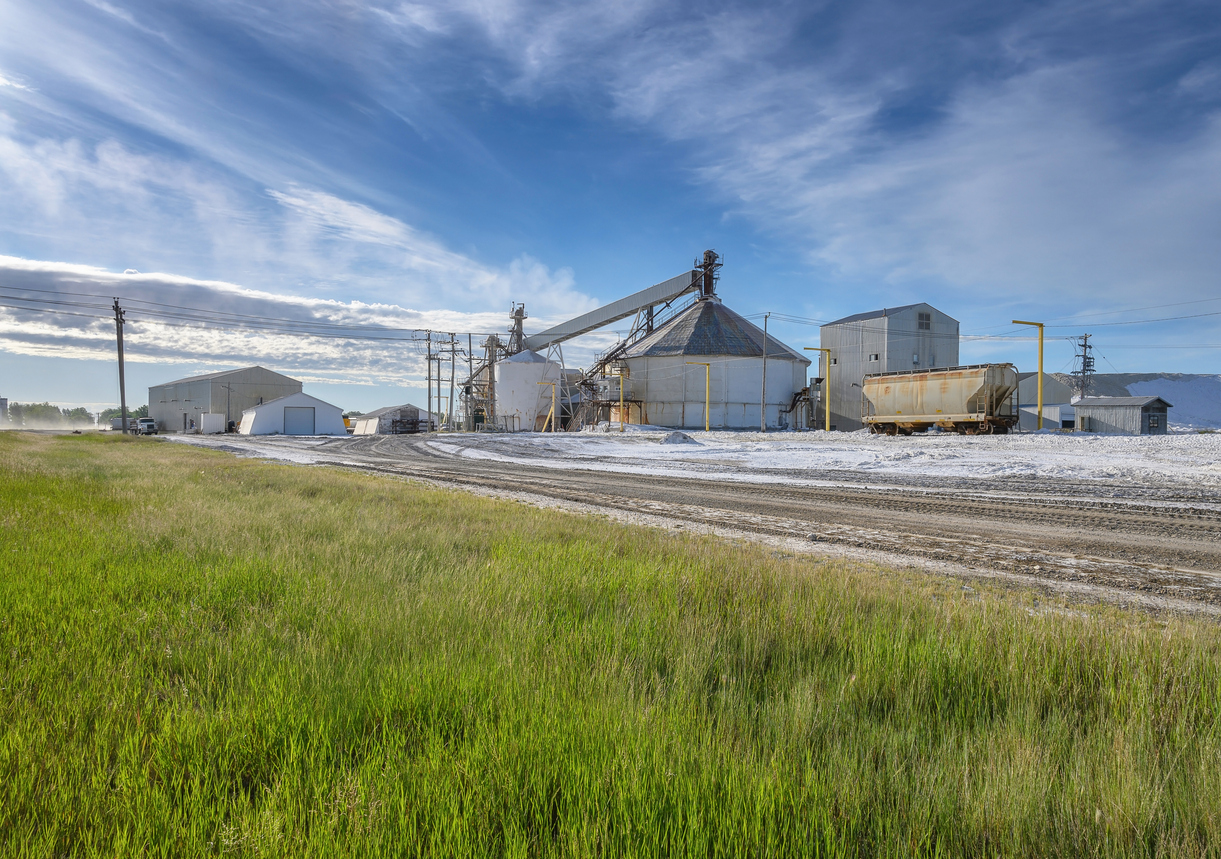
As the year kicks off and investors prepare for the future, here are some of the potash mining companies that should be on their radar in 2023. These companies have created some of the biggest producing projects, opened new hiring or investment initiatives, or are developing new projects that are set to change the potash market completely.
Brazil Potash
Brazil Potash is a Canadian potash mining company developing the Autazes Potash Project in Manaus, Amazonas State in Brazil. The project aims to double potash output in the coming years and make Brazil self-sufficient in terms of potash production in the near future. The project is a sustainable engineering investment that will produce potassium chloride, an extremely important fertilizer.
Brazil is currently a net importer of potash, due to a combination of factors like limited production and growing demand. With Brazilian demand expected to continue growing, the project has the potential to make a huge dent in the demand domestically. The country is the world’s largest net exporter of agricultural products and food but requires potash imports to hit those numbers. This could be solved with domestic potash production which would drive down agricultural input costs immensely.
The company is currently in the pre-production phase but is open to investment, providing an opportunity for investors to get in on the ground floor of an exciting new potash project.
Western Resources (TSX:WRX)
Western Resources (TSX:WRX) and its wholly owned subsidiary, Western Potash, are working to build a capital-efficient, environmentally friendly potash solution mine at the Milestone Project in Saskatchewan. The full ramp up of operations is projected to begin in mid-2023. In June 2022, WRX announced the next phase of Milestone Project restart, which will involve the completion of processing facilities and the development of solution mining.
Karnalyte Resources (TSX:KRN)
Karnalyte Resources (TSX:KRNN) is a company specializing in the construction of its advanced Wynyard Potash Project in Central Saskatchewan. The company has completed feasibility studies, and the project is ready for construction, with financing in the process of being secured.
Why Potash Mining is More Critical Than Ever
The potash mining industry is seeing more investment and attention than ever before for a few key reasons:
Potash and Fertilizer Shortages Threaten Food Security
One of the biggest risks to global food security is the current and potential shortages of potash and fertilizers. Potash is a critical mineral for crop growth and food production, as it increases yields and helps to keep soil healthy. As population growth and demand for food and resources increases, potash and fertilizer shortages could become a major concern.
With potash and fertilizer prices rising, potash mining is becoming an increasingly attractive industry with the potential to help ensure food security. By investing in potash production, countries can reduce their reliance on imports and gain more control over their own food security.
A Monopolized Market
The potash market is currently dominated by only a few major players, with most of the major extraction and production operations concentrated in North America and Russia. This has led to a lack of competition, which has resulted in artificially high prices and a lack of innovation.
Investing in potash mining companies and diversifying production could help create a more competitive and open market, which could lead to lower prices and better products.
Opportunity for Growing Brazil’s Domestic Potash Market
Brazil is the world’s largest net exporter of agricultural products and food, yet it is a net importer of potash. This is due to a combination of factors, such as limited production and growing demand. With Brazilian demand expected to continue growing, there is a vast opportunity for potash mining companies to capitalize on this potential.
The Autazes Potash Project from Brazil Potash, for example, aims to make Brazil self-sufficient in terms of potash production in the near future, which could drastically reduce agricultural input costs and provide a more secure food supply for the country.
Potash mining is an incredibly important industry for global food security, and with the right investments and initiatives, it could help to ensure a more secure future. In 2023, investors should keep a close eye on the potash mining companies mentioned above, as they are well-positioned to capitalize on the opportunities in the sector.
The above references an opinion and is for information purposes only. It is not intended to be investment advice. Seek a licensed professional for investment advice. The author is not an insider or shareholder of any of the companies mentioned above.
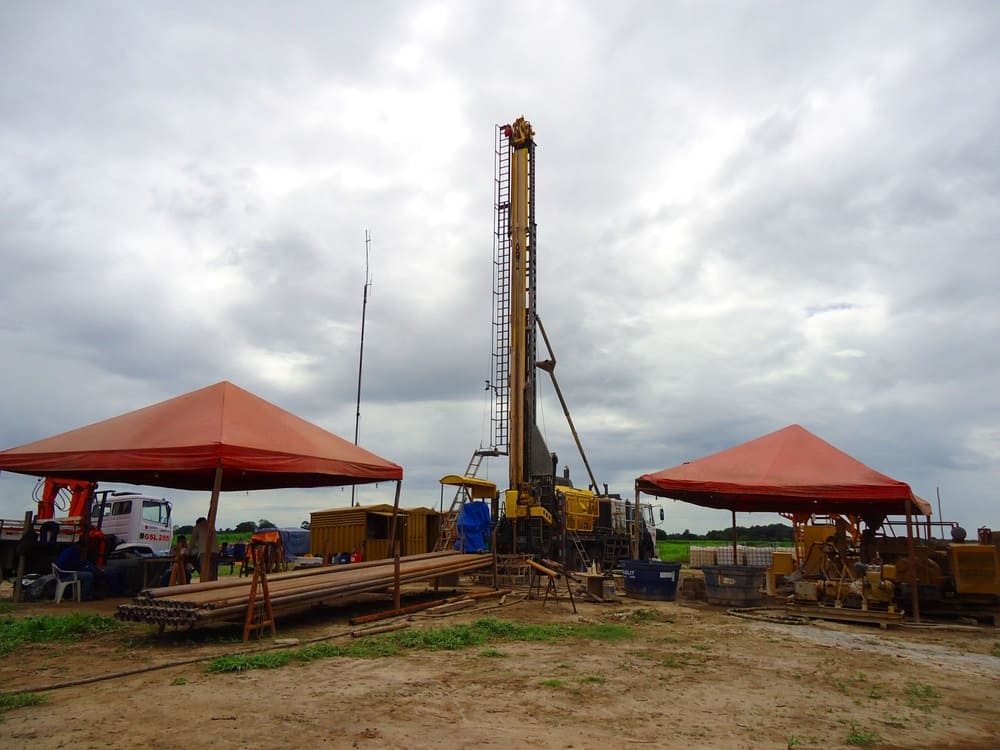
Brazil is home to a vast supply of potash, a natural mineral found in abundance within the country’s soil. This mineral is helpful in the production of fertilizer and is an important resource for the agricultural industry. Thanks to recent advancements in technology, the potential of Brazil’s potash mining industry has been unlocked, allowing Brazilian miners to access and harvest this mineral in a safe and efficient manner. Let’s explore the potential of Brazil’s potash mining industry, the technology that is being used, and the economic benefits it could bring to the country and the potash mining market.
Brazil Potash is a Canadian mining company with its flagship Autazes Potash Project near Manaus, Brazil. The Brazilian government has given the project its support, and last year there had been plenty of discussion about the importance of fertilizers to the country. The administration released the National Fertilizer Plan, highlighting the importance of potash in the country’s fertilizer mix.
The Autazes Potash Project’s goal is to double the current production, changing the domestic market completely. Currently, the global potash market is dominated by a small group of countries including Russia, Canada, and Belarus. This in turn makes it more expensive for companies and countries to import potash for important applications such as improving crop yields and fertilizer quality.
The Autazes Potash Project has the potential to be so large that it could single-handedly change the potash market dynamic and ultimately shift Brazil from a net importer to a net exporter in the future.
Brazil is one of the world’s largest exporters of agricultural products, and its potash mining industry is not contributing to this success. The country has a large number of potash deposits, estimated to be around 45 billion tons, which is enough to cover the world’s demand for the mineral for decades. The deposits are located mainly in the northern regions of Brazil, and they are considered to be some of the most promising in the world.
The Development of a Potash Mining Project
There are several stages to a potash mining project that must be completed before the mineral can be effectively and safely extracted. The first step is to conduct a geological survey of the area, which includes the use of geophysical instruments to determine the size and shape of the potash deposits. After this, a drilling program is conducted to further characterize the deposits and create a three-dimensional map of them. This is followed by the construction of a mine, which is typically done using underground mining techniques.
Once the mine is operational, the mineral is extracted and processed in a number of ways, depending on the type of potash being mined. Potash can be processed into a variety of different products, including fertilizer, animal feed, and industrial chemicals. After this, it is ready to be transported to its destination.
The Benefits of Potash Mining in Brazil
Potash mining in Brazil has a number of benefits to the country’s economy. It creates jobs in the mining industry and helps to drive the development of rural areas. It also generates taxes for the government and provides a reliable source of income for the communities around the mines.
The increased production of potash also helps to promote the sustainable development of the agricultural sector. The fertilizer produced from potash helps to increase crop yields and improve soil fertility, which can help to reduce hunger and poverty in rural areas.
Unlocking Brazil’s Full Potash Potential
Thanks to projects like the Autazes Potash Project, Brazil is now on the verge of unlocking the full potential of its potash industry. This will bring significant economic benefits to the country and the potash market as a whole. It will also help to reduce the global dependence on a small group of suppliers and provide a reliable source of potash to the world.
The above references an opinion and is for information purposes only. It is not intended to be investment advice. Seek a licensed professional for investment advice. The author is not an insider or shareholder of any of the companies mentioned above.
If you would like to receive our free newsletter via email, simply enter your email address below & click subscribe.
CONNECT WITH US
Tweets
Tweet with hash tag #miningfeeds or @miningfeeds and your tweets will be displayed across this site.
MOST ACTIVE MINING STOCKS
Daily Gainers
 |
CMB.V | +900.00% |
         |
CCD.V | +100.00% |
         |
CASA.V | +30.00% |
         |
AAZ.V | +25.00% |
   |
RMI.AX | +25.00% |
   |
POS.AX | +25.00% |
         |
KGC.V | +20.00% |
         |
GDX.V | +20.00% |
         |
LPK.V | +16.67% |
         |
CCE.V | +16.67% |

 Follow us on Twitter
Follow us on Twitter Become our facebook fan
Become our facebook fan







